#like ultimately he's fighting for Stephen
Explore tagged Tumblr posts
Text
this is corny, but Gray Yeon is literally so "Angel With A Shotgun" coded
#like ultimately he's fighting for Stephen#but he's also fighting for all his friends#ooooooughhhhh finding symbolism in songs about my blorbo makes me so fricking sick#wish I could be regular about him#weak hero#webtoon#gray yeon
2 notes
·
View notes
Text
A topic that nobody asked for (or asked, i don't know), the main gang nemesis on Season 5:
Eleven🖕Linda Hamilton Character:


Yeah i know what you're thinking, "what about Vecna", but just follow me. Linda Hamilton character is apparently a female Brenner, but with actual military experience, so she will be a manipulative scientist like Brenner, this already makes Eleven having a hatred towards her probable. The hand to hand experience that she has can be dangerous for the rest of the gang aswell. Some people probably think it doesn't make sense for her to be throwing hands, but it's Linda Hamilton we are talking about, the OG Sarah Connor, the Duffer Brothers will make her a beast in a fight, both with guns or with her bare hands.
Will🖕Mind Flayer and Vecna (and Lonnie too):
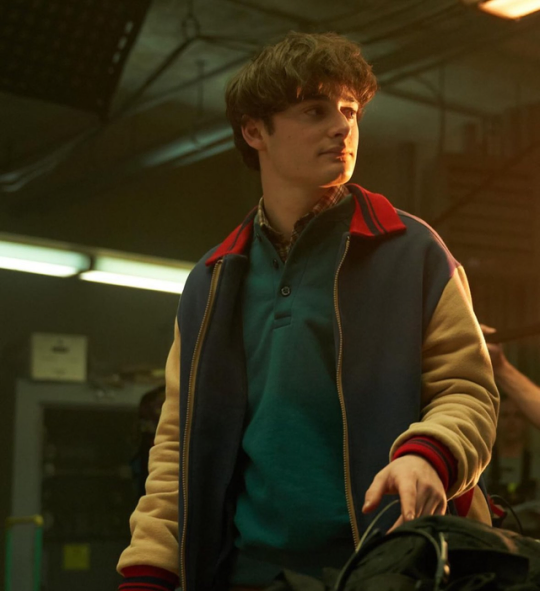

This is why i think Eleven wouldn't have Vecna as her ultimate nemesis. Henry has a lot of similarities with Will as we can see on his flashback, but they ended up as total opposites. And we don't need to talk about Mind Flayer beef with Will, it's kinda embarrasing to be a interdimensional entity and still having the need of tormeting a teenager gay loser.
And there is that bitch ass Loonie too, i don't have anything too say about him.
Mike🖕Unnamed Creature (and Chance):

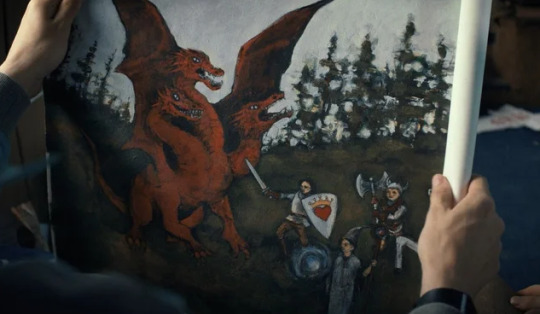
To start, Mike beef with Chance won't be because of this weird and boring theory that Chance has a crush on Will, but because Chance is the total opposite of Mike, he just follow orders and stay quiet, Mike is someone who wouldn't let anybody dictate what he is supposed to do (there's a post comparing all of the four core with the basketball gang, but i couldn't find it, sorry).
This unnamed creature is probably what was roaring during that scene of Robin, Nancy, Steve and Eddie on the Upside Down. It is probably that monster that Nancy saw on her visions. My bet is that Hopper will probably give that sword for Mike, giving the title of hero to him.
Hopper🖕Sullivan:


What is better than give a tramautized ex-soldier a Colonel as his enemy? It would be pretty much a cycle ending, after he got scarred for life and lost his first daughter because of higher ups that made him help them with war crimes against their enemies, he will end the life of one them that is actually trying to kill his second daughter too.
Dustin🖕Andy:
Some people are kinda of underestimating Andy, if you watch season 4 again you'll see how unhinged he is (i will make a post talking about how much of a threat he can be in this season), besides the fact that he will seek revenge for Jason by attacking the hellfire club ex-members, and Dustin is pretty much using their shirt in most of the paparazzi pics.
Lucas🖕All of the Basketball Team:
He probably is angry at them because of Max situation and they're angry at him because of Jason death. I hope to see some kind of revenge by Lucas part.
Jonathan and Steve🖕This Soldier:


On one way or another we will have a scene of Jonathan and Steve beating some asses together, and this guy seems to be around the age of 25 or a little bit older, so they can pretty much have a showdown against him. This could be that epic scene Jonathan and Steve will share together that the hawkinsfamilyphoto (Chris, a paparazzi) said he would release if he reaches a certain amount of payed members on Twitter/X.
Robin and Vickie🖕Town Folks:
I have this theory that some type of religious cult group will be manipulated by Henry, and they will have something against the whole group and mainly with Will, Mike, Robin and Vickie because of their little secret.
Here's a link for the post talking about this theory:
What about the others?
The rest of the group would have the same enemies as the others, just with less hatred or rivalry against them.
#stranger things#byler#miwi#mike wheeler#st5#stranger things 5#will byers#stranger things season 5#byler endgame#eleven hopper#jonathan byers#steve harrington#robin buckley#vickie stranger things#rovickie#jancy#lucas sinclair#dustin henderson#jim hopper#st5 speculation#st5 production#st5 leaks#st5 spoilers#henry creel#vecna stranger things#vecna#the mind flayer#linda hamilton#el hopper#jane hopper
56 notes
·
View notes
Text
So I blew through Ultimate Marvel Team-Up in order to get context for when Daredevil starts sticking his horns back into the main Ultimate Spider-Man book, and what's really interesting to me is that Bendis's rendition of basically every non-Spider-Man cape who shows up in that gesture at what could have been an extremely cohesive Ultimate Marvel setting;
Hulk is very visibly classic Hulk in every respect, but with the added implication that he's currently neck-deep in a thriller-conspiracy uncover-the-truth kind of plot regarding the government experimentation with super-soldiers that's upstream of all of superhumanity in the Ultimate Universe. This idea was later binned, Banner was framed as neck-deep in spook shit and unlikely to try and defect from it in the way he was implied to be trying to do.
Iron Man's origin is changed so that he got abducted by rebels while attempting to sell weapons technology to a right-wing U.S-backed junta in Guatemala during the Reagan Admin, and moreover in direct retaliation for attempting to do that; this is upstream of his decision to stop selling weapons technology, and the two-shot where he teams up with Spider-Man involves Latveria attempting to steal the Iron Man Armor- with Tacit SHIELD Backing, because Nick Fury is willing to let Dr. Doom have that tech if it increases the chances of the U.S. Government eventually getting a crack at it. This extremely interesting cold war dynamic between stark and Fury also mostly got binned.
The Fantastic Four are nearly identical in function to their 616 counterparts, except that instead of a spaceflight they got their powers on a years-long expedition to the Negative Zone, having Challengers-of-the-Unknown style adventures, which both neatly resolves the datedness of the spaceflight origin and allows them to have their veteran hero status simultaneously with the idea that the heroic age is just starting out. The Negative zone was also mentioned to be the home dimension of the Skrulls, Kree, and possibly Galactus, neatly explaining why so many spaceborne threats keep making themselves earth's problem so specifically. Ultimate Fantastic Four was just good enough (And Bendis's two shot otherwise boring enough) that I can forgive the parts of this that they binned. I mean we got Marvel Zombies out of it, that's worth everything in the world
Ultimate Dr. Strange is interesting in that he's the son of the original Dr. Strange, whose origin, career and supporting cast are actually largely exactly the same but also linked to the IRL time period of Strange's debut, the early 60s through the early 80s. Stephen Strange Jr. is the inheritor of a legacy his disillusioned Mother Clea spent twenty one years trying to keep him well away from, rapidly attempting to learn the ropes under the apprenticeship of a long-suffering Wong and largely coming across as a scientologist-adjacent crank in the media. This is actually a really fun way to put Strange at the Metaphorical kids table with the rest of the aged-down heroes while also keeping him from breaking every story, and although Bendis did get to keep using him in this capacity it ultimately didn't amount to much because he got turbofucked during Ultimatum after only a couple of appearances.
Shang Chi is introduced in the middle of a Kung-Fu walking-the-earth situation, with Spider-Man haphazardly (and unsuccessfully) seeking him out for martial arts lessons when he realizes he's just leaning on his powers as a crutch in most fights. He offers him like 20 dollars
The broad outline of a lot of these ideas, and the political themes they were gesturing towards, survived their later delegation to other authors to some extent, but were corroded by Millar's cinematic bombast on The Ultimates in particular. I mourn the version of the Ultimate Universe where they just gave Bendis enough amphetamines to have him do all of it. At any rate you bet your ass that if I ever commit to trying to do some kind of fanmade unified Marvel Timeline I'd poach all of these
65 notes
·
View notes
Text
My reason for liking Gojohime (Gojo Satoru x Iori Utahime)
The main ship dynamic I’m obsessed with is “opposites attract” combined with banter. I love when two characters with completely different personalities, backgrounds, and worldviews come together, and the contrast sparks this kind of intense relationship dynamic. It’s not just about having differences; it’s about how those differences create tension, growth, and genuine connection.
In these kinds of ships, there’s always a push and pull—one character challenges the other, forces them to look at the world differently, and sometimes even changes how they approach their life. The tension makes for the best moments, but the growth makes these ships so rewarding.
Examples:
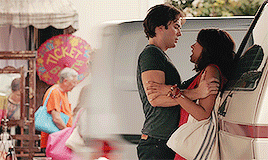
Bonnie Bennett x Damon Salvatore (The Vampire Diaries)
Bonnie is all heart, driven by love, family, and morality, while Damon is sarcastic, emotionally detached, and deeply cynical. Their constant bickering, where Bonnie calls out Damon’s worst qualities and Damon pushes Bonnie to see beyond her own principles, creates this tension-filled relationship. And somehow, they end up understanding each other in ways no one else can.
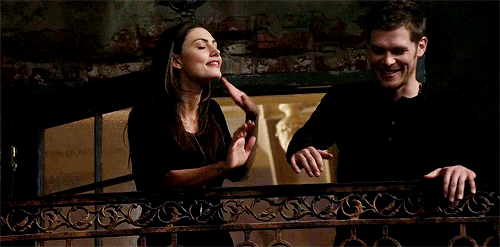
Klaus Mikaelson x Hayley Marshall (The Originals)
Klaus is a tortured soul, raised in violence and deception, while Hayley is a strong-willed, independent woman fighting for her family. Their relationship is full of conflict, yet they share this deep understanding and respect. Klaus's control contrasts sharply with Hayley’s more free-spirited attitude, but somehow, they balance each other in a way that strengthens them.
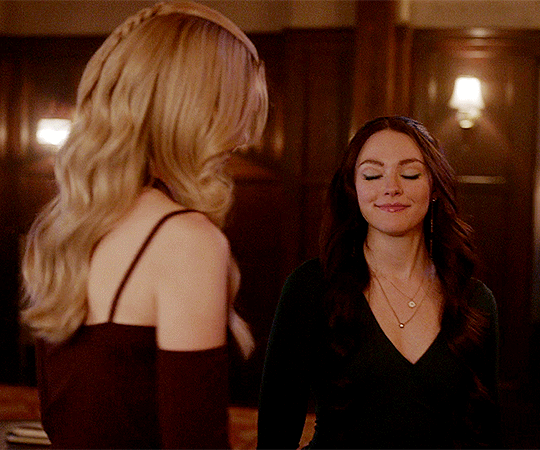
Hope Mikaelson x Lizzie Saltzman (Legacies)
Why it fits: Hope is burdened by her powerful supernatural legacy, often distant, intense, and emotionally guarded. Lizzie, on the other hand, is emotional, unpredictable, and eager to prove herself. Their contrasting approaches to life—Hope's serious, heavy-hearted nature versus Lizzie's more impulsive, lighthearted attitude—creates a tension-filled dynamic where they clash often. But, despite their differences, they push each other to grow and ultimately come to understand each other in ways no one else can.
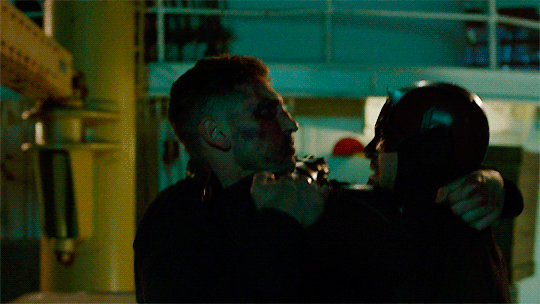
Matt Murdock x Frank Castle (Daredevil & The Punisher)
Matt believes in justice, redemption, and compassion, while Frank sees the world in black-and-white terms—no room for mercy. Their constant ideological clash makes for incredible banter, but it’s also what forces them to grow. They push each other’s boundaries, and their relationship isn’t just about saving the world, it’s about learning how to do it.
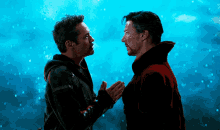
Tony Stark x Stephen Strange (Marvel Cinematic Universe)
Tony is impulsive, reckless, and emotional, while Stephen is disciplined, precise, and strategic. Their personalities are worlds apart, and their banter reflects that. Tony’s ego and impulsiveness often clash with Stephen’s pride and ego, but their partnership grows because they challenge each other in ways no one else does.
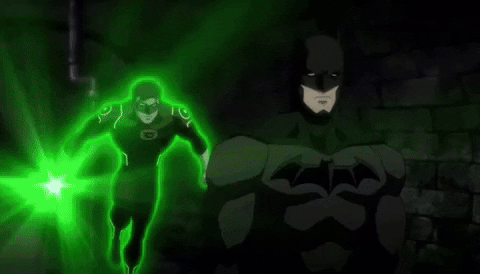
Bruce Wayne x Hal Jordan (DC Comics)
Bruce is brooding and emotionally intense, while Hal is carefree and cocky. Bruce believes in order, control, and the strict rules of justice, while Hal has a more flexible approach. Their bickering and constant clash of philosophies make them both stronger and force them to realize that there’s more than one way to save the world.
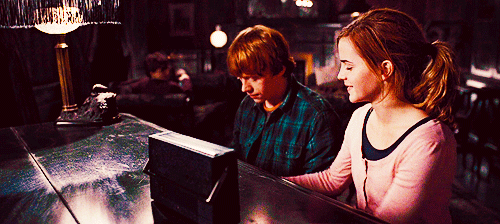
Hermione Granger x Ron Weasley (Harry Potter)
Hermione’s perfectionism and drive to always be in control often clash with Ron’s more laid-back attitude. She’s focused, while he’s insecure and occasionally a bit of a mess. Their banter is legendary, and while they argue all the time, they ultimately help each other grow, and their differences become what makes them work so well together.
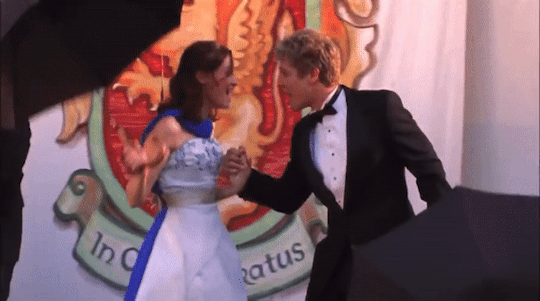
Rory Gilmore x Logan Huntzberger (Gilmore Girls)
Rory is determined, focused, and often a little high-strung, while Logan is charming, rebellious, and loves to push people’s buttons. They have this dynamic where they’re constantly challenging each other—Logan pushing Rory to take risks and live a little, and Rory keeping Logan grounded and focused. Their back-and-forth banter is one of the highlights of their relationship, and the way they grow from each other is amazing.
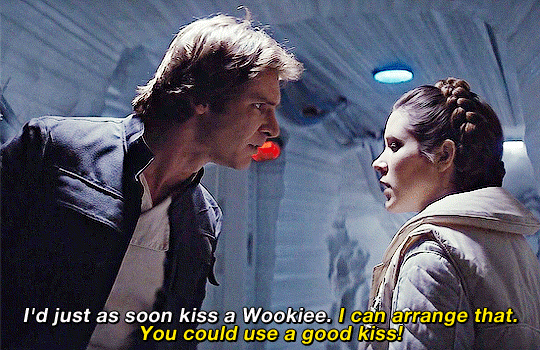
Han Solo x Leia Organa (Star Wars)
Han and Leia have one of the most iconic opposites attract dynamics ever. Han is the cocky, roguish smuggler who does things his own way, while Leia is strong-willed, no-nonsense, and very focused on duty. Their chemistry is undeniable, and their constant bickering is just a front for their deep respect and affection for each other. It’s one of those ships where the banter makes the relationship.
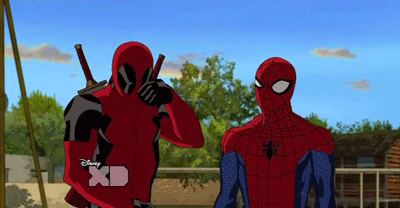
Spider-Man (Peter Parker) x Deadpool (Wade Wilson)
Why it fits: Peter is awkward, idealistic, and a little bit of a nerd, while Deadpool is chaotic, crude, and doesn’t follow any rules. The contrast between Peter’s earnestness and Deadpool’s unpredictable humor creates the best kind of banter. They push each other’s limits, and Deadpool’s unfiltered attitude forces Peter to lighten up, while Peter helps Deadpool remember there’s more to life than chaos. Their constant back-and-forth is hilarious, but underneath, there’s a genuine bond.
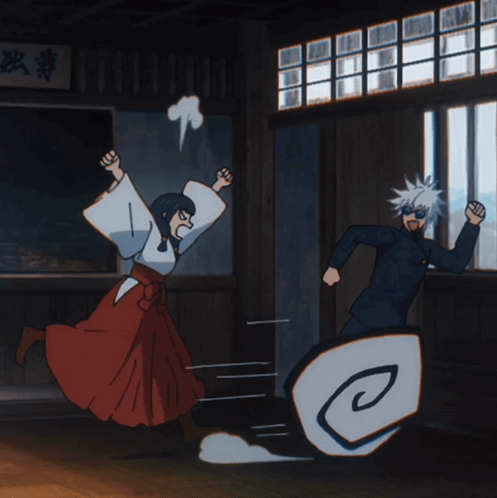
Gojo Satoru x Iori Utahime (JJK)
One of the main reasons I love this ship is because it perfectly embodies the “opposites attract” dynamic. Gojo and Utahime couldn’t be more different in terms of their personalities and how they see the world. Gojo is brash, cocky, and full of confidence, while Utahime is calm, reserved, and more pragmatic. The way their contrasting energies clash creates this incredible tension that I can’t get enough of.
These ships, with all their banter, tension, and contrasting personalities, are what I love. They might not be everyone’s cup of tea, and I totally get that.
At the end of the day, these are just my thoughts and preferences, and they reflect the kind of stories and dynamics that speak to me.
If this post isn’t for you, no worries—just keep scrolling! Everyone’s entitled to their own tastes, and that’s the beauty of fandom.
But if you do get it, or if you love these ships too, then I’m so glad we’re on the same page!
#the hard life of shippers#gojohime#gojo x utahime#bamon#bonnie x damon#klayley#klaus x hayley#hizzie#hope x lizzie#mattfrank#matt x frank#ironstrange#stephen strange x tony stark#stephen x tony#batlantern#halbruce#bruce wayne x hal jordan#romione#ron x hermione#rory x logan#han x leia#hanleia#spideypool#peter x wade
31 notes
·
View notes
Text
Do you ship it? ((C*nt of the month edition) trying not to get banned)

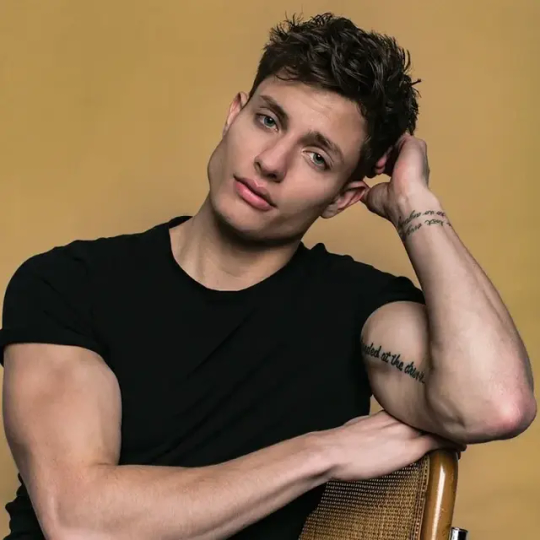
Hi Matt! Since I know comedians these days love googling themselves and finding things about them that piss them off so they can whinge on stage about it, I have something to show you. Here's a list of people in history with disabilities who made more of an impact on the world than you could possibly imagine;
1: Michael Bisping, professional MMA fighter, had multiple fights at the highest level on the trot with an impressive win ratio with a missing eye, unbeknownst to anyone but him (would love to see you make fun of him)
2: Albert Einstein, most famed and celebrated professor of the 20th century, was on the autistic spectrum. Gave more to the world in a year than you did in your life.
3: Tim Burton, among the most famous directors, producers and animators in history, revolutionizing goth culture in his long career, is also autistic. He put in far more work than standing on stage and being a dick.
4: Stephen Hawking. Even an idiot like you knows this one. I'll leave it at that.
5: Hellen Keller, was literally deaf and blind for most of her life and was still a famous author. So whats your excuse for writing such shit, tasteless jokes?
6: Zack Gottsagen, an actor with down syndrome, became the first actor with down syndrome to present an Oscar.
7: Stevie Wonder. I imagine even he could see how utterly insufferable modern comedians are.
Nooooow then, lemme guess, "yOu'Re jUsT a PiSsEd oFf TrAnS pErSoN gEtTiNg OFfEnDeD" lemme tell everyone something about myself.
I'm not trans.
I'm straight.
I have no physical disabilities whatsoever.
I actually don't get along with a lot of lgbt people because they're, guess what, PEOPLE, very few of whom I get along with anyway. Its never once been to do with their identities or rights, but purely because, as is the case with every demographic, most of the ones I've met are pricks.
"BuT ThEy GEt OFfEnDeD-" yes, when you deliberately scroll twitter looking for offended lgbt people, you tend to stumble across them. Wouldn't ya know it?
Anyways. Comedy is dog shit. Getting up on stage and deliberately being edgy because you've lived no sort of life away from people who you know you'll offend is not talent. Its something a 14 year old with an inferiority complex would do. Thanks for being another nail in the coffin of actual, watchable comedy.
Oh yeah, and if you want an example on how to actually joke about domestic violence, cross-reference the name "Wilbur" on my blog. See, its funny when you're making fun of the abuser and the fact that they do these things, but not when you mock a victim and make fun of them for having these things happen to them. Never once do I mention his victims, its purely making fun of him and the sheer absurdity of his behavior in the scope of who he is. And we're on Tumblr, literally the symbol of people getting offended, and never once have I gotten backlash for those jokes, so you, as a man with a Netflix special, have no excuse for such lacking creativity.
One last thing, for my readers... anyone wanna bet some petty cash that a woman or three from his past are gonna come out with a few tasty bits of drama about ol' Matty boy, if you know what I mean?
#my polls#tumblr polls#shitpost#poll time#crossover#shipping poll#polls#rarepair#crackship#shipping#wilbur situation#dsmp wilbur#wilbur soot#wilbur support squad#wilbur supporters dni#lovejoy#matt rife#comedy#comedy is dead
64 notes
·
View notes
Text
so i don’t understand what is *so* hard to get about the idea that rhaenyra being crowned as queen *peacefully* would’ve at least introduced the baby-step process that women can inherit the iron throne, even if it doesn’t automatically lead to absolute primogeniture and prompt benefits being established for -all- women.
book-wise we have one (ONLY one) inkling of how rhaenyra feels about the succession, and it’s that she doesn’t wish to alienate any more allies than she already had:


show-wise we have a vague and contradictory line of jace and baela’s sons inheriting the iron throne followed by luke and rhaena’s children inheriting the driftwood throne, which just seems like an inconsistency in the writer’s room, but why is that *such* an issue for those that support aegon’s claim to begin with? rhaenyra only has sons (biologically) at this point, so we really don’t know whether or not she would’ve named a daughter as her heir over a son, but this thought process derives from real history. eventually female heirs were allowed in certain circumstances but male children were *always* preferred (until recently). this still doesn’t change what her reign would’ve entailed had there not been war. rhaenyra is allowed to fight for the right her father granted onto her when she was 8 years old, aegon was not entitled to it simply because he was born with a penis and his mother raised him to believe that made him special.
jeyne arryn, one of her staunchest allies, point blank states what will happen to women heirs and ladies in their own right if the greens are allowed to repudiate the succession, because it’s something she -personally- had gone through:
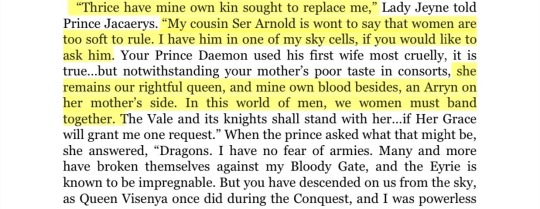
“in this world of men, we women must band together,” the green council states that they cannot rely on the eyrie for support due to is presently being ruled by a WOMAN. they knew what this would mean for women moving forward.
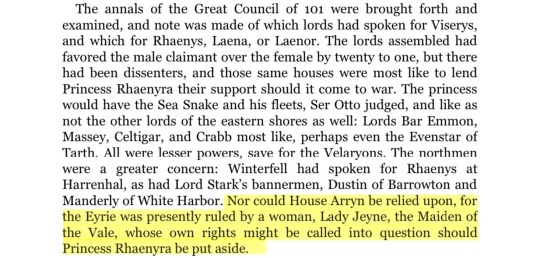
if we were to look into the history of english monarchs the first (official) queen regnant of england was mary i, who ruled for five years, and didn’t make any changes to the rules of succession during her reign (any that involved gender, any battles she faced mostly had to do with religion). she was followed by her sister elizabeth i, who ruled for 45 years, and made no changes to the rules of succession. both of whom ascended as queen because there were no male relatives alive at the time, but each obviously proved that women were just as capable of men ruling, releasing at least some of the stigma surrounding that subject during their time alive. it wasn’t even until recently, during the reign of elizabeth ii (in 2013, specifically), that absolute primogeniture was enacted into law, ending the system of male-preference cognitive primogeniture. mary became queen in october of 1553, so it took 460 years for this change to occur.
rhaenyra is based off empress matilda, daughter of henry i, who would’ve been the first queen regnant of england had she not been challenged and deposed by her cousin, stephen of blois, in a war known as the anarchy; with it ultimately ending when a peace treaty was signed by both stephen and matilda, with her son henry ii named as stephen’s successor upon his death (which happened a year later). this war began in 1135, which was 878 years before the succession was formally changed and 418 years before england would actually see a queen on the throne. this is just to put it into perspective how one queen is not going to immediately enact change for the betterment of all women whilst attempting to rule an age-old abhorrent system, but saying that they had no bearing on succession laws and gender equality moving forward is wild.
not only did rhaenyra only reign for six months, she was in the middle of a civil war that had resulted in the deaths of four of her children (as far as she knew) at that point. among that the treasury had been depleted and sent to green loyalists, so she was taking over a country with virtually no money at hand. her reign was damned from the start, and her near broken mental state led her to make some bad decisions. from the beginning of her heir ship she was looked down upon for being a woman; her stepmother spread vile rumors about her virginity when was in her early teens, her sworn shield groomed and took advantage of her, her siblings were raised to hate her and view her as a threat to THEIR birthright and lives, her father was nigh on useless in protecting her against any of this due to his pacifist and pushover nature. she was usurped because she was a woman, and ultimately killed because she was a woman. denying the tragedy of her life is refusing to understand the deeper components of the story being told.
if women aren’t even able to hold offices of high power how is anything supposed to change for those in even worse circumstances? women didn’t gain semi equal rights by being silent and subservient to the men around them, they gained them by fighting back against the status quo; by marching, lobbying their politicians, lecturing those willing and unwilling to listen to their plight, causing civil disobedience, etc. we shouldn’t condemn those that do not have the will nor the ability to participate in these events, but refusing to understand their opposites and overtly criticizing how imperfect they are or blaming them for their suffering is not the way to go.
once again, rhaenyra is not a feminist, but she should be seen as a proto-feminist figure by us, the audience, for her will to stake her claim as the first woman to sit the iron throne. her usurpation and subsequent murder leads to the death of all dragons, a catastrophic consequence considering her parallels to the amethyst empress and the dire stakes at hand in regard to the second long night.
#house of the dragon#hotd#fire and blood#rhaenyra targaryen#pro rhaenyra targaryen#team black#pro team black#anti team green#anti team green stans#real feminists do NOT support the patriarchy just bc it’s headed by misogynistic white woman who cries prettily#and thinks she’s the only exception to the ‘no women in power rule’ AND a violent misogynistic rapist as king#i would think this should be obvious#but hotd has allowed some truly braindead takes to spread#all by sex obsessed airheads that can’t differentiate attractive actors from the characters they play#if you see any mistakes in this NO YOU DIDNT
118 notes
·
View notes
Note
The truth about Alicent Hightower: why is she so disliked?
https://youtu.be/t9HjamrAMfU?si=QpoUMPQQSuTWmovz
I found this video on YouTube. I didn't watch the video, but I did read the comments, and many of them were negative toward Alicent. I want to know your thoughts on this video.
The comments are negative towards Alicent because the creator's request for engagement consisted of asking her audience to share why they disliked Alicent. Though I do feel inclined to enquire myself: why are you asking me to react to this video if you haven't even watched it?
Many of these talking points I have already addressed in my lengthy meta posts over time:
There is a conflation of Alicent from the books and Alicent from the show. Show!Alicent was not sent to comfort Jaehaerys and is more innocent and trusting that book!Alicent because she is younger.
Alicent is hated by many viewers for "seducing" Viserys. The creator says she doesn't and denies that people blame her for that, but they do. It's an easily-verified, observable reality and, thus, a strange thing to even say.
Jace/Helaena is not an advantageous marriage for the greens.
"Why was Otto spying on Rhaenyra?" It's literally his job. "He deserved to be fired". It's literally his job to be spying on everyone and report the information back to the King.
The Hightowers are faced with the fait accompli that Aegon will not be named heir. They went into the marriage fully believing that Alicent's sons would overtake Rhaenyra in the line of succession, as was the social norm.
It ultimately comes back to what I was talking about these last few days. This is the result of a conflation of several factors:
ignorance about what medieval social and economic arrangements actually were (what is feudalism? what is manorialism?);
stubbornly clinging to the notion that Westeros is an absolutist monarchy and that "the King's word is law";
downplaying the bastard issue, i.e. refusing to acknowledge how concerning the division of the marital estate was to inheritors and blaming it entirely on misogyny-fueled sex-negativism;
having no concept of what common law is or how it functions.
People can't let go of this image that Westeros is a capitalist modern state with an authoritarian leader (the King). And dragons. (It's Russia, basically. The dragons are bears).
Most of TB's discourse contains some combination of the above, which is why, honestly, at this point, if people are so invested in still talking about this, I would truly suggest a primer in medieval history, because this is getting ridiculous. These reasonings are just not rooted in a tangible basis of reality and trying to engage with them is like fighting windmills.
In the same vein, I wish people would stop bringing up the point of Alicent misunderstanding that Viserys changed his mind on his death bed. I get it, you think it's a dumb argument, but, lo' and behold, it's actually lifted straight from real history and, to the shock of thousands of Twitter users, it worked. What now? Stephen of Blois truly is crying in the afterlife because you think this little trick of his lacks realism. 🤦♀️
#they don't understand how much modern institutions shape their daily lives#institutions which are totally absent from westeros#it doesn't even have a parliament#'pass a law' pfffff#anti rhaenyra targaryen#anti team black#alicent hightower#there is also the refusal to accept that rhaenyra has any power over her own situation#and that she also could have made better choices both for herself and for the realm#'what was rhaenyra to do?' renounce being heir! or be smarter about it!#girl pick a struggle fr#ask#anon#also. like. you have to laugh at OP's characterization of rhaenyra being groomed by daemon during their night out in town#& then coercing criston into sex#as 'her living her best life'
46 notes
·
View notes
Text
0129: Doctor Strange (vol. 2) #5
Cover Date: December 1974 On-Sale Date: September 10, 1974

And we come to the end of the first arc of our new Doc solo series. Sadly this is Frank Brunner's swan song as he leaves Doc, never to return. It's sad. Fortunately Gene Colan returns to art chores next issue. Doc died last issue and returned to life in the last few panels. Let's see what he does with it and what he does to Silver Dagger.
Clea is still a prisoner of Silver Dagger who is still attempting to break and "reform" her from the teachings of her demonic former instructor. Clea calls him mad and he replies he's as sane as anyone, proving it by comparing himself to Cotton Mather and members of the Inquisition. Yeah, that proves your sanity! Because it's what villains do and maybe Steve needed to burn a few pages of real estate, Dagger expounds on his origin!
In a nutshell: Dagger-to-be was a priest in the Catholic Church who worked his way up to cardinal. He expected to become pope but someone else was elected. For reason this makes Dagger-to-be in his own words "comprehend the power of evil." It sounds to me more like he's the ultimate sore loser. Brunner has some odd ideas about clergy vestments. Here's Dagger-to-be as a cardinal.

Here's the pope that's about to die wearing I don't know what.

Dagger-to-be goes wandering around in a fog until he stumbles into the Vatican forbidden library. He reads and reads and believes God has a new mission for him. To stamp out black magic with black magic. To me this is like fighting pornography by making hardcode blue movies, but what do I know? By the way, Brunner's Vatican Library has some cool books.

H. P. Lovecraft would be amused in-between his thoughts about European superiority. Dagger-to-be searches out mystic practitioners, learns all he can from them and murders them. He went to find the Ancient One but the old dude was already dead. For some reason Brunner draws the crypts of Kaa-U instead of the lamasery at Kamer-Taj. Did Dagger-to-be get his addresses mixed up?

Clea has now fainted. We don't know if she heard Dagger's entire story, but it doesn't really matter. While Dagger is distracted by Clea's current state, something slips out of the nearby All-Purpose Amulet of Agamotto. It's Doc! In through the Orb, out through the Amulet. Hey, maybe Dagger stealing it was a good thing! Doc doesn't have to travel.

Doc's senses have expanded and he's having one gnarly trip and it's without the aid of LSD!

This is definitely one time where eccentric panels work like a charm! Doc tries to find his body, but instead finds the wax figure Dagger decapitated a few of issues ago. He's confused and enters it anyway. He actually manages to get it going, despite like things like muscles.

Kicking the head is a nice touch. Doc-figure creeps up on Dagger and this is a truly marvelous image.

Dagger cuts the wax-figure to pieces, but Clea suspects more is at work here.

Doc "surges" into Clea. I think Englehart was perfectly aware of the double entendre he wrote! Together the two escape Dagger and flee back to the Sanctum Sanctorum. Steve and Frank even give us bystanders gawking at Clea's kooky outfit!
Clea/Stephen arrives back at the Sanctum and they ask Wong if Doc's body is still there. He answers in the affirmative while we look in on Dagger in hot pursuit. Dagger is not exactly thrilled about being mugged along the way.

Back at the Sanctum, Clea/Stephen asks why the body is still here and Wong says he couldn't bring himself to make the journey to Kaa-U. He probably dreads having to dig the place out with he bare hands after the place collapse in Marvel Premiere #10. He also mentions, that Doc doesn't have the usual dead body smell. Doc rejoins his body which, fortunately isn't really dead.
Dagger has arrived and he is so focused on Clea he hasn't put the clues together that Doc might still be alive. Dagger burst into the study with Doc and Clea. Frank gives us some great, cinematic panels.

After his poor aim, Dagger uses the Amulet to attack Doc and Clea. The pair manage to take over the eye. Clea remarks that she's able to to this much easier now. Doc "surging" into her appears to have increased her power. The pair point the Eye at Dagger who is suddenly filled with wisdom (or something) and jumps into the Eye!

The ordeal over, Doc and Clea share a tender moment. Guess where Dagger is?

The caterpillar has an eternal conversation partner!
And those we close the arc! Sadly it's Frank's final turn on Doc except for a one-shot in 2010. He has really been spectacular. Next issue Gene Colan restarts his long association with Doc. He will have a pair of runs that will end with issue #47. He returns for one more issue in the successor series.
This is a charming finale. There's so much at stake, but as in previous stories, these high stakes are told in an intimate tale with a small cast. Steve manages to communicate Dagger's insanity both through his origin and his actions. The man is loony! Doc hangs onto Dagger's dagger and Chris Claremont even remembers it, although it functions a bit differently. I'll get to that one in a couple of months.
Doc shows why he is sorcerer supreme. He approaches Dagger after he invades the Sanctum with a combination of caution and confidence. His absolute faith in Clea is on display here as well. There are some minor glitches I pointed out above but they don't distract from the larger story. A well done finale from one of my favorite creative teams.
#doctor strange#doctor strange reviews#stephen strange#clea#wong#silver dagger#agamotto#steve englehart#frank brunner
8 notes
·
View notes
Text
Midnight Pals: Love on a Battlefield
Stephen King: guys did you hear there’s a video game campfire too? Mary Shelley: that sounds like some nerd shit King: no no there are lots of cool people there King: hideo kojima, sid meier, bob bates King: the 2 guys from andromeda Shelley: [cracking knuckles in anticipation]
Hideo Kojima: IN THE YEAR OF OUR LORD 19XX, MERCENERY GASEOUS SNAKE IS BROUGHT OUT OF RETIREMENT TO FIGHT THE REMNANTS OF THE WOLFDOG UNIT... Kojima: INCLUDING... Kojima: ROPE CHOKER, POISON EATER, TORPEDO LAUNCHER , AXE GRINDER, BOMB DETONATOR, AND DIPPY DOG
Kojima: do you think that love can bloom on a battlefield? Kojima: Kojima: yes... Kojima: even on a battlefield... Ken Williams: hey my girlfriend roberta and I saw you from across the bar and we’re really digging your vibe Williams: Can we buy you a drink?
Kojima: the villainous traitor bad boy has kidnapped dr good scientist and forced him to help build the ultimate weapon of mass destruction... Kojima: the metal gear... Kojima: it’s like a tank... Kojima: but it can move... Kojima: Kojima: But wait... Kojima: not with treads... Kojima: with legs...
[at Midnight Society] Hideo Kojima: I have an idea for a new video game... Kojima: About you! Stephen King: oh wow a game about us? that sounds pretty ok! Poe: yeah I’d be curious about this Kojima: the game is called ‘the association of Fire Story friends’ Kojima: a hideo kojima game... Kojima: written by hideo kojima... Kojima: produced by hideo kojima... Kojima: directed by hideo kojima... Kojima: catering by hideo kojima...
Kojima: The fire story friend association members names are... Kojima: Bird Scare.. Poe: Kojima: Clown daddy... King: Kojima: Knife Stabber... Mary Shelley: Kojima: Little Friend... Dean Koontz: Kojima: Cat Bitch... Clive Barker: Kojima: and Silly Racist... Lovecraft: Lovecraft: w-which one is me
Kojima: SUBMITTED FOR THE APPROVAL OF THE MIDNIGHT SOCIETY I CALL THIS THE TALE OF THE STORY FRIENDS... Kojima: IT IS A GAME WHERE THE GOAL IS NOT TO FIGHT... Mary Shelley: what the hell is this shit Thomas Disch: sh let him cook Disch: mr kojima in level 5 is there a way to escape the dungeon w/o the wizard‘s key? Shelley: shut UP nerd
Kojima: In this game, you play as clown daddy... Kojima: bird scare has given him an assignment... Kojima: he must tell a story without anyone hearing King: wow! incredible! King: hideo, once again you’ve redefined a genre!
Kojima: this story is also about how war is bad... King: whats the theme tho Kojima: Kojima: uh, its that war is bad... King: Koontz: Poe: Lovecraft: Barker: Kojima: perhaps this three hour cutscene will explain better...
Kojima: now this next story will be my last ever... Kojima: for real this time... King: aw really? Kojima: yes... King: King: really?
#midnight pals#the midnight society#midnight society#stephen king#clive barker#edgar allan poe#dean koontz#hp lovecraft#mary shelley#thomas disch#hideo kojima#ken williams
109 notes
·
View notes
Text
this is the best explanation i’ve found for the “why does it only happen here” discourse on gun violence in america. it’s not all of it, but this explains a lot of it.
in short, it’s because america was founded on slavery.
transcript below for those that prefer that.
Why We Carry
Alain Stephens: If there is one thing to know about America, it's that it’s a land of revolution. And no one would know that better than a Virginia blacksmith with a plan: Gabriel Prosser.
Carol Anderson: He and his brother had in fact created swords as part of their weapons in order to fight this rebellion but they knew…
Alain Stephens: Gabriel and other early American arrivals had grown tired of working under the bootheel of an institution they had no stake in creating. No rights. A world where your life and livelihood were dictated by born status, not merit. So he spread the word to nearly 1,000 like-minded men with a promise.
Carol Anderson: He said that all of those who believed in liberty would be able to be in this incredible space, would be able to enjoy this vibrant democracy.
Alain Stephens: Gabriel’s enemies were better armed, organized, already suspicious of sedition. If he and his men were planning on getting out alive, his operation would have to be executed sharply, swiftly, perfectly.
Carol Anderson: The plan was to have basically three divisions. One division would set a warehouse on fire as a diversionary tactic. The other division would go to the treasury and get the money in order to be able to pay for the insurgence. And the other division would go to the armory and get the guns and the ammunition that they needed in order to fight for their liberty.
Alain Stephens: You see, Gabriel Prosser and his conspirators were some of America’s first patriots. But you’d never know it. Because they were Black. And the enemy they were fighting was the United States. To be specific: The plantation-class government of 1800s Virginia, whose number of enslaved people accounted for nearly 40% of the state’s total population. And Gabriel and his followers needed guns to take on the government. Gabe’s rebellion would ultimately be dashed. A freak storm on the eve of the attack shook the resolve of the men, one more than the others. In particular, a conspirator named Pharaoh.
Carol Anderson: He's sitting out there and the rain and the thunder is hitting, and every time there was a crack of lightning, every time there was a burst of thunder, his nerves were shattering. And so he was like, “OK, we gonna die. We just gonna die.” He's like, “I'm gonna be free, but I'm gonna be free by telling my master about this plot.”
Alain Stephens: In total some 70 men would be arrested. Gabriel, his brother, and 23 others would be made examples of and hung. A few others would be sold to plantations out of state. And two would be granted freedom for being informants to the government. While many Americans may have heard of the Nat Turner rebellion in Virginia or the Stono rebellion in South Carolina, as a Black journalist covering the history of American violence, I discovered that there were nearly 300 slave revolts throughout the course of American history — most of which have been purposefully erased.
Alain Stephens: I’m Alain Stephens, and you’re listening to The Gun Machine: How America Was Forged by the Gun Industry, a podcast by WBUR and the Trace. On the last episode of The Gun Machine, we explained how America built its early gun industry. In this episode, we have to go back to the actual beginning — and ask the why.
Alain Stephens: What type of society necessitates the need for not just militaries to be armed, but everyone—all the time? Today, we talk about America’s foundation of fear, and how the gun industry was built on top of it. Chapter two: Why we carry.
Alain Stephens: It's the 1600s in Central Europe. Two things are about to happen that will change the world forever. The first is the invention of the flintlock musket. Before that, the systems that sparked the gunpowder in guns were finicky in wet or humid conditions. But the flintlock musket was reliable, battle tested and therefore prime to be exported outside of the mild European temperatures. And secondly, the Protestant reformation had swept through Europe. The Catholic church had long banned the sale of European guns to non-Catholic nations, but Protestant churches didn’t care. This caused the Catholics to abandon their policy, sparking a mass sell off — Europeans dumping guns into new countries. And it was in Africa, where Europeans will find the closest and most worthwhile commodity for trade: Human cargo. And just like that, the Triangle Slave Trade was born. The guns-for-bodies trade was so high that by the 18th century, records show gunpowder accounted for nearly 40% of European imports to Africa. But, the firearm wasn’t just the lubricant of the slave trade abroad. It was also its guarantee — right here in America. The invention of the firearm was a force multiplier. It was the gun that made colonial slavery even possible. UC Berkeley history professor Brian DeLay says the firearm now gave regular, working colonists the ability to control those in bondage even if they were outnumbered.
Brian DeLay: Slavery was a fact in every single colony. And of course, it was concentrated in the Southern colonies. And slavery doesn't work without a weapons gap.
Alain Stephens: By 1775, before we were the United States of anything, 20% of America’s colonial population was enslaved Africans, most of them living in the South, all of whom posed a potential security risk to established order.
Brian DeLay: This required the able-bodied adult male population of white colonists to be armed at a far higher rate than, say, was the case among average working people in Great Britain at the time.
Alain Stephens: So if I was a Black person living, say, in 17th-century America, how would I go about getting my hands on a gun? And what opportunities could that make for me?
Carol Anderson: You would have the opportunity to be whipped. Thirty-nine lashes, that's the opportunity that you had.
Alain Stephens: This is Carol Anderson, a professor of African-American history at Emory University, who has been investigating something you probably haven’t heard about in school: the link between the Second Amendment and America’s long history of slavery and racism. Let me go ahead and burst that bubble and hurt your feelings right now, and get this out the way: Most Americans subscribe to certain myths about the foundation of our country.
[( music) “We hold these truths to be self-evident, that all men are created equal…”]
Alain Stephens: But that was never the case. The South had gone all in on plantation slavery from the start. Which brings me to the next myth: That plantation slavery as a system just somehow worked, when in fact, the slave economy was a dangerous economy. Large-scale slave rebellions continuously rocked the country, not to mention many other individual acts of defiance and violence in the face of enslavement. Enslaved people fighting back against their enslaver; I’m talking about stabbings, beheadings, shootings, real heavy metal shit. But it also meant that plantation societies had to function like prison societies. So if you had to imagine the South, imagine a network of omnipresent slave patrols on the horizons, contraband and shakedowns, and the constant looming suspicion that at any given time these plantation owners could all get their little slaving heads cut off. In 1680 Virginia prohibits Black people from using a gun in self defense against white attackers, even if they are free. In 1681 the colony of New York bans Black people from having any sort of weapons. In 1741 North Carolina’s legislature implements state-paid bounties for slaves, and the right for patrollers to keep any guns and other contraband plucked off the enslaved as personal rewards during shakedowns.
And this was all before the Revolutionary War even took place. By the time the Colonies began drafting the Constitution, there was no standing military. And the creation of one would be highly regulated. But at the same time, a number of southern colonies were concerned with a more internal threat to their peculiar institution: Slave revolts. So they demanded the constitution include a security backstop to their enterprise: Give us the ability to carry guns, quash insurgencies, and support the web of slave patrols that had already been established.
Carol Anderson: The bad history that we have had about the Second Amendment. How it gets cloaked in this nobility of the militia fighting off domestic tyranny and fighting off of foreign invasion when in fact the militia really wasn't really good at either of those. What it was effective at was putting down slave revolts.
Alain Stephens: Without the Second Amendment, many Southern colonial forefathers refuse to ratify the Constitution at all.
Carol Anderson: The Second Amendment was the bribe to the South to not scuttle the Constitution of the United States and to therefore not scuttle the nation itself and it was George Mason talking about we will be left defenseless if this militia is put under the control of the feds. We cannot trust the federal government to protect us from these Black people.
Alain Stephens: Now, I know what you’re thinking: Why do I not know about this? And that is actually by design. First and foremost, Americans still struggle to talk about the national embarrassment that was slavery. We don’t like to think of our society as violent. And after the writing of the Constitution it just gets more violent. Like I said earlier, there were nearly 300 slave uprisings from the country's inception to the end of the Civil War. And if you read abolitionist newspaper clippings from the Antebellum era, you hear of countless other tales of violence and threat. Escaped slaves using contraband revolvers to shoot it out with captors. Enslaved women bludgeoning to death their white assaulters. A parent killing their own child rather than return them to the horrors of servitude. But there is another reason we don't know about it. And that is a strategic one. Back in the 1800s, Insurrection was bad for business. In the 1860s, the economic value of the enslaved was worth $4 billion. In today’s money, that comes out closer to $42 trillion. That was more than all the banks, factories, and railroads in the U.S. were worth at the time. Stories and plans of rebellion were inspiring to Black people. And the U.S government was aware of this, and acutely aware of similar things going on internationally, with successful slave revolts in places like Haiti. So there was a desire to keep these stories out of public view.
Carol Anderson: The Haitian Revolution, I've got to say upfront, scared the bejeebers out of the Founding Fathers. When you look at their correspondence, they're like, oh my God, did you see what just happened in Saint-Domingue? Oh, if those ideas come here, we are going to be in trouble. If Black people believe that they can be free, that these ideas about liberty and justice apply to them, we are doomed.
Alain Stephens: So these stories were erased from American history. But that fear of Black people, and the need to defend oneself from Black people, didn’t go away after the end of slavery with the Civil War. In fact, in many regards, those fears got worse.
Nicholas Buttrick: When thinking about what makes America unique, you know, it's really not that much of a skip and jump to see, well, is there anything to do with our history of enslavement, our history of civil war, and the ways that we've thought about who is safe and who is dangerous in our country?
Alain Stephens: Nicholas Buttrick is a professor of social psychology at the University of Wisconsin in Madison. He has spent the last couple of years researching how and why America formed its current gun culture. What he found was: A great deal of how we view the need to carry guns today, stems from attitudes formed in the wake of Reconstruction.
Nicholas Buttrick: You have emancipation and with emancipation comes the rise of Black political power and for the white antebellum elite, it seems as if this is something that cannot stand.
Clip from Gone With The Wind: Well, Ashley, you're wrong. I do wanna escape too. I'm so very tired of it all. I've struggled for food and for money. I weeded and hoed and picked cotton until I can't stand for another minute. I tell you, Ashley, the South is dead. It's dead. The Yankees and the carpetbaggers have got it and there's nothing left for us!
Alain Stephens: This line from Gone With the Wind may seem melodramatic to us, but for Scarlett O’Hara and crew, it was an understatement. The American South during reconstruction was a hellhole, akin to any modern post-war occupational environment you’d see today. Law and order was nearly abandoned. Basic commodities were scarce. The only thing in ready supply were the newly freed Black Americans beginning to cement their burgeoning political power and an avalanche of post war guns. White Americans in the South lose their goddamn minds at the new status quo.
Nicholas Buttrick: A lot of the speeches that these redeemers were using is that they seem to anchor a lot of sort of Southerness — Southern masculinity, ways of restoring a Southern way of life — in firearms specifically. And I think this makes a lot of sense, that the South, while destroyed physically, was just totally awash in firearms.
Alain Stephens: Homicide rates were 18 times higher in the South than they were in the North. And these guns were different. The Civil War was one of the first conflicts with mechanized production of guns. Soldiers return home with high-quality weapons — and lots of them.
Nicholas Buttrick: And you also have a really dangerous society. You have murder rates that are completely out of control. And so you have a dangerous world with a lot of weapons, and it maybe makes sense that rich white Southerners might look to different sorts of ways of figuring out how to suppress Black power and to rally white power. And one of the items we think that was really super salient were all these guns.
Alain Stephens: White southerners formed hundreds of so-called rifle clubs, claiming they needed to defend themselves against Black people, even though most of the murders at the time were white on white. The clubs were actually armed white supremacist groups meant to intimidate voters and diminish Black political power. This started forming a modern gun identity and set forth ideas in people about what the government could and couldn’t do. In the Reconstruction South, state constitutions were being rewritten. For the first time, Black people had political power. Many white Southerners didn’t trust the government to represent their interests. To protect them and their sense of order. So they felt they had to take matters into their own hands, and guns were an important symbol. Buttrick’s research makes one thing abundantly clear. The counties with the highest rates of enslavement before the Civil War are the places where today we see the highest rates of gun ownership. And by following social media connections, Buttrick also found that as those same Americans have migrated around the country, so have those ideas about guns. The communities with the deepest social and cultural ties to slaveholding counties, carry similar feelings about gun ownership in the present day. His research also suggests that while people think of guns as a defense against physical threats, they’re also using them as a defense against psychological threats.
Nicholas Buttrick: Guns become a sort of a totem or a charm, you know, that help gun owners to feel their lives are more meaningful, that they have more control, and that they feel safer.
Alain Stephens: It’s also an identity that has fueled gun companies and gun sales.
Nicholas Buttrick: And so I think that the Civil War in its aftermath, set a template, but it's a template that we've then been building on as a society for quite a while and so, it's not just that these things happened once and and ended, you know, that there is quite a lot of advertising, quite a lot of marketing, which is sort of reinforcing these beliefs that we've had about how guns work.
Alain Stephens: And for a hundred years white people become ingrained with the notion that firearms in this country equals autonomy, identity, and most of all power. And that’s all fine and dandy, until Black people start getting guns too.
Newsreel: The Black Panthers first made national news just a year ago when they entered the state capitol in Sacramento armed with rifles and pistols.
Alain Stephens: In 1967 when the Panthers march on the capitol, legally carrying guns to protest a newly proposed gun control bill, then-Governor Ronald Reagan would respond by signing it into law: Banning public carry without a permit. The NRA would approve. It would become the state’s first major piece of legislation restricting the right to carry a gun, and would lead to a slew of gun control laws targeting Black people nationwide. Then, the following year, we’d really melt down.
Newsreel: Martin Luther King 20 minutes ago died.
Newsreel: The police and national guard also used the Justice Department guidelines of restraint, at least in theory. It was still a bloody, costly three days for Chicago.
Alain Stephens: In the wake of King’s death there would be over 100 uprisings. And Congress would renew a once-stalled effort to limit access to guns. They’d pass the 1968 Gun Control Act, which laid the groundwork for modern laws around who is allowed to buy and sell firearms. But, more importantly, just look at the here and now. As demographics change, we fragment. The Obama administration sparked record gun sales for the time, but it wouldn’t hold a candle to 2020. If COVID had us locked, the murder of George Floyd — and the protests that followed — would get us absolutely loaded.
Newsreel: This is an unlawful assembly. Please…
Newsreel: These are not acts of peaceful protest. These are acts of domestic terror. (Protest jeering sound)
Newsreel: One person shot and killed at a Black Lives Matter protest in Austin, Texas
Newsreel: When the Proud Boys Group showed up, a confrontation caused a violent street fight to break out. Police ordered the crowds to disperse, and they also…
Alain Stephens: Americans would buy over 40 million guns in 2020 and 2021. That’s more guns than the entire population of Canada. Five million of those Americans would be grabbing a piece for the first time. And it would pour billions into the pockets of the gun industry. I would watch in real time as my beat as a gun reporter went from niche specialty to sitting front row to the largest wave of gun buying in recorded American history. How’s that for job security?
Alain Stephens: And it’s not like it's an undercurrent that gun culture hasn’t been afraid to tap into.
Dana Loesch: Make them protest. Make them scream racism and sexism and xenophobia and homophobia, to smash windows, burn cars, shut down interstates and airports…
Alain Stephens: In that ad, the NRA calls racial justice protests “madness” and calls on Americans to fight them with what they call a “clenched fist of truth.” Rifle producer Daniel Defense ended up in Congress last year where lawmakers grilled them on using extremist iconography in their ads.
Kelly Sampson: That's a valknut, and it's a symbol that has been increasingly embraced by white supremacists.
Alain Stephens: But it doesn’t have to be that explicit. I’ve always been a gun nerd. And growing up, I’d cringe at the number of times I’d come across Confederate flags, Nazi war gear, and/or straight-up disdain of anything not white American. It’s this shadow that, no matter how far I go into the community, is still always there. And don’t get me wrong… I’m not trying to say that everyone who is buying a gun is doing so because they are racist. More so, that when your country is founded on a fundamental fear of the person next door, carrying a gun is a lot more palatable than not carrying one. But if gun ownership and the gun industry was built on whiteness, what does it mean to be a Black gun owner now? We’ll find out in a minute.
–
Juan Dahl: You heard that?
Alain Stephens: Yeah.
Juan Dahl: That was a gator.
Grace Tatter: I did not hear that
Alain Stephens: That’s producer Grace Tatter. And this is the Bunker Club, it’s a field in Clermont, Florida, where hundreds of gun enthusiasts assemble in the swamp-like humidity to do one thing: Play with hundreds of thousands of dollars worth of high-powered weaponry, and we’re gonna play, too.
Alain Stephens: It's asking me: “Am I currently on probation?” No. “Have I ever been adjudicated as a mentally defective or committed to a mental institution?” No. “Under influence of alcohol or drugs or anything?” Negative. “Issued a restraining order, domestic violence act, barring me?” No. “Have you ever handled a handgun?”
Alain Stephens: This is Pew Party 2.
Alain Stephens: Yes. “You ever handled a rifle or shotgun?” Yes. Click here to sign.
Alain Stephens: It’s a Black-led shooting event, and it’s the second time it’s being held in as many years. It’s a playground of berms, tires, and targets.
Grace Tatter: Have I ever handled a handgun? No. Rifle or shotgun? No. I think I'm the only person here who probably answered no to both of those questions.
Alain Stephens: Pew Party 2 is an event created by Jay Jenkins, aka Jay the Shooter, a self-described GunTuber — a firearms social media influencer.
Jay Jenkins: The G17 has consistently lost, so Imma get a Glock a let a few rounds off
Alain Stephens: Jay’s a businessman — one of the few Black people in the country who carries a coveted FFL SOT 3, a federal license that allows him to develop and sell things like suppressors and automatic weapons. These events are about building his brand, where he invites regular people, particularly Black people, so they can do two things: Meet face to face with the cutting-edge companies in the gun industry, plus they get a chance to handle some iconic and advanced weaponry.
[sound of gunfire]
Alain Stephens: Oh my god, that was tight. That was a P90 over there. So, look at it. It's kind of like a sci-fi looking gun, has this crazy magazine that fits on top. But a pretty good fast rate of fire, so, you know… Again, these are all, you know, movie guns, things that like high level military, like, you know, things that, are in catalogs, that most people’d never be able to touch.
[sound of gunfire]
Alain Stephens: Are you over my shoulder? Get this. When we run out, it's gonna make this awesome sound.
[sound of gunfire]
Alain Stephens: And that was the sound.
Alain Stephens: If you can’t tell, I actually love guns. And I always have. I’m Black, but more specifically I’m biracial. I was introduced to guns at a young age by my dad, a white man from Appalachia. And I remember the stares I’d get growing up, going to gun shows down south in Texas. The standoffish gun shop owners. The rangemasters, who with a sheer glance, would remind me that no matter who I was with or how trained I was, I was there as a guest. So, for me, Pew Party is different. It’s an eccentric assortment of the familiar but the unfamiliar. It’s the most Black people I’ve ever seen at a shooting event, and therefore probably the most comfortable I’ve ever been in such a space.
Alain Stephens: I mean like, you hear the hammer drop on this thing. Did you see the rounds?
Alain Stephens: There are things you’d never see at a gun range. Like a DJ, and a Caribbean food truck. And all day a few throughlines became very clear. First, almost every Black person we spoke with clearly understood what it means to be black and all the pitfalls that accompany it. And their response to that reality was on them. That their life was in their own hands.
Crystal: One, as a Black person in this country, as well as a woman in this country, it's very important that we be able to protect ourselves with the best tools that are available.
Thomas Lyles: My self-protection is serious.
Tay: How about: Take advantage of your Second Amendment right and do what you need to do to protect you and your family.
T.J.: I wanna protect me and mine.
Alain Stephens: Secondly, that crazy year of 2020, where there was open white supremacy, government failure, and Covid-19, and the fallout of George Floyd — well, Black people saw it too. And we flocked to guns. Here is Thomas Lyles, a Navy vet and firearms instructor.
Thomas Lyles: When Trump was in office, that's when we saw the largest spike of Black gun ownership. And so, a lot of Black people during that time, they felt as if the government, the police, nobody was going to help us or protect us. And so it was on us. We had to protect ourselves.
Alain Stephens: When he talks to us he is wearing a military chest rig adorned with bits of African kente print, and is carrying thousands of dollars of military-grade hardware. This is my first time meeting him in person, but I’m familiar with his social media:
Thomas Lyles, from social media: One finger pushes the slide back. I think it might be a good recommendation for female shooters.
Alain Stephens: His training isn’t to put holes in paper, but winning gunfights.
Thomas Lyles: Some of my family members, I taught them a CCW class, because during that time when Covid was happening, we had all the protests going on, this country seemed very unbalanced, right? It's very uncertain. And so even some of the people my family, years before that, had been like “I don't need a gun. I've been alive 40 years and nothing's ever happened.” But during that time all of a sudden I was getting these phone calls: “Hey, cousin, nephew, when can you come over and teach me a class?” And now they're into guns. My uncle's into guns, my cousin's into guns, like he's buying rifles, building rifles, buying pistols.
Alain Stephens: In fact, according to the National Opinion Research Center at the University of Chicago, 69 percent of people who bought their first gun during the pandemic were people of color. Before that, POCs accounted for only 26 percent of registered gun owners. And if you looked at America through a thousand-foot lens, it kind of makes sense. Black people are some of those most victimized in the country and always have been. We have police systems that hurt more than help, where Black people are five times more likely to be arrested than whites, and three-times as likely to be killed during a police encounter. And with this long pattern of isolation and victimization, is it really a surprise that more Black people are buying guns, too?
Alain Stephens: And how does the industry react to this? Backwards AF. As quick as the NRA is to savage Black Lives Matter protests to rally their base in defense of the gun industry, they’re also quick to point out that often, laws controlling gun ownership have been racist. Literally using critical race theory to fight its battles in court. Some of the messaging in recent years has been, “Come on over, Black customers. We’re happy to have you.” But that same organization collectively shrugs at the death of legal gun owners, like when police outside of St. Paul killed Philando Castile during a traffic stop. It rallies for more aggressive policing, and backs racist politicians. It’s this worldview that contributes to the reality that many of the Pew Party’s participants exist in: The odd looks and stares at gun ranges. The distinct feeling that everyone’s not going to like them — or what they represent. Every Black male we interviewed was acutely aware of toxic images portrayed of Black men with guns — which is why Jay The Shooter says he hosts events like these.
Alain Stephens: You said one thing about, you know — and I think this is crazy and I gotta revisit — but you said that when it comes to firearms that Black people have really been a victim of poor marketing.
Jay Jenkins: Yes.
Alain Stephens: What has that marketing been and who has put that marketing out there?
Jay Jenkins: Well, you know, let’s be honest. Let's take some accountability here, right? We have to stop conducting the acts that put ourselves in a negative light. Let's start there. Let's start with first accountability. I believe in Black accountability first. And then we can start working on the values and everything else that we need to do to really clean up a lot of the negative images that are being perceived and promoted and projected on us.
Grace Tatter: But a lot of times, so like some of the racist anti-Black images, like gun companies, not all, I'm not saying … the industry isn't a monolith, but gun companies have made a lot of money off of making people afraid of people, afraid of Black people. How does that, how do you fit into, how do you deal with that?
Jay Jenkins: Right. Right. Look, at the end of the day, every company has their business model. We have to see it for what it is, right? And not be subject to it. Yeah. The fear mongering is there. It is there. I see it. But I choose not to look at that because my mission is not to combat that. My mission is to push legitimacy when it comes to African-Americans, and incubating consumers to merchants. That's my mission. I can't stop what I'm doing to go look at what they're doing. Like we know it's there. But how do I combat that? By throwing events and bringing more community awareness to what it is. How many times did you pass by somebody today and you saw first time shooters, shooting suppress, first-time shooter shooting a machine gun. First time hands-on with this platform from this company. That's my mission. I focus on that. Will I be able to combat what they're doing? No, but I'm putting good media and good press and I'm putting my own marketing out there that I can control. So instead of sitting back and complaining about what they're doing with their targeted marketing when it comes to the Black community, I also have to target my community and put the positive messages out there. That's how I combat what they're doing.
Alain Stephens: Essentially it’s a form of exposure therapy. Jay wasn’t alone in his sentiments of trying to take the fear out of the image of a Black man carrying a gun in the broader American consciousness. And things like this event, and training seminars, and social media were ways for them to do it. When it comes to the broader gun industry and how they market, a lot of the attitude was not too dissimilar from the mantra: If you can’t beat em, join em. But perhaps with a caveat to change them from within. Throughout the day though, we had plenty of conversations about self defense, about the power of Black dollars, and it’s to get lost in the money to be had in this industry. But, a woman at the event named Krystal Harper reminded us of another reality: that Black people are also the most victimized by firearms.
Krystal Harper: There's a lot of trauma surrounding firearms within our community that just needs to be dealt with in addition to lack of knowledge, lack of history. But like, we don't talk about that trauma.
Alain Stephens: And we don’t talk about it. Gun violence in all forms has increased sharply for Black Americans in recent years. Black people now experience 12 times the gun homicides, 18 times the amount of shooting injuries, and nearly three times the fatal police shootings of their white counterparts. Luanda Akosua, a firearms trainer, says she sees the consequences of those statistics.
Luanda Akosua: It happens a lot, you know, especially in certain areas. I know I get a nice percentage of my students that do have trauma. I actually had one girl who broke down, like anxiety, full anxiety attack on the range. But it's just a matter of, kind of, coming at it from behind and being able to relate to them, because I'm able to relate, because I've also been in that situation.
Alain Stephens: And many Black people can relate, our community is tight knit. Although we only account for about 13% of the population, we absorb a disproportionate amount of America’s gun violence. So this means that 71% of Black adults know someone who has been injured or killed by a gun in their lifetime.
Luanda Akosua: After you've experienced trauma, I believe there's a point in time where you have to say, ‘I am not gonna be a victim to this trauma,’ and I have to take measures into my own hands to be able to heal from this trauma, from the inside out — going inward, in healing, and starting that process. But you have to be the one to start that healing process. So at the end of the day, I think you are responsible for it. In a perfect world, we don't want anyone, you know, of course the person that's giving the trauma — but usually a person that's presenting trauma, they don't care about anyone.
Krystal Harper: At all.
Luanda Akosua: You know, they don't care. So when they don't care, you have to care about yourself, you know? And I think that's the ultimate goal is being able to self-love, love yourself, respect yourself enough to come out of that dark space and … and train.
–
Alain Stephens: For me as a reporter, and a Black gun owner, I’m always driven to this space, this fundamental conflict. Because on one side, the gun industry and the Second Amendment community needs to diversify to survive. But, on the other, the only way it can do so may mean facing down its racist past and the latent fears that fuel the industry. And with all the guns in the world, that prospect is still the scariest. On the next episode of The Gun Machine, we meet the man who wrote the playbook for a successful gun company.
John Bainbridge: He was somebody who I would say had enormous charisma, and incredible drive. Uh, but as I say, I wouldn't trust him.
Alain Stephens: So after America secured its “freedom”, and it used weapons to secure its enslaved workforce: What next? Well, it’s time to expand. And with that, expands the gun machine.
34 notes
·
View notes
Text
Why 'Black Sails' Is Still Worth a Watch
These pirates' lives made for some great television.

(Spoiler alert for people haven't watch!)
The Big Picture
Black Sails is an underrated pirate series that serves as a prelude to the novel Treasure Island.
The show explores the origins of Captain Flint and John Silver, and their journey from noblemen to pirates.
The series features an ensemble of real-life pirates, has a prolific cast, and delves into darker and more introspective themes than other pirate shows.
Pirates make for great entertainment. From the swashbuckling thrills of the Pirates of the Caribbean films to the animated antics of One Piece, and recent hit shows like Our Flag Means Death, buccaneers and their battles on the high seas have provided a wealth of stories for screens large and small. One of the most underrated pirate stories happens to be the Starz series Black Sails. Over the course of four seasons, a gripping narrative of blood and betrayal was woven.
Created by Jonathan E. Steinberg and Robert Levine, Black Sails was crafted to fill the void left by Starz's previous heavy hitter Spartacus. And much like the Rome-set series, Black Sails features an ensemble cast and drew inspiration from another creative work. In this case, the show serves as a prelude to the novel Treasure Island by Robert Louis Stevenson, and focuses on two characters from the novel: Captain Flint (Toby Stephens) and new crew member John Silver (Luke Arnold). While other prequels to famous works feel the need to explain every little detail that surrounds the preceding source material, Black Sails takes a different path and explores how its pirates came to be the men they are.
Captain Flint and John Silver Are at the Center of This Swashbuckling Story

In the second season, Flint is revealed to have turned from a nobleman's life to that of a pirate following the imprisonment and death of his lover Thomas Hamilton. Adding salt in the wound is the death of Thomas' wife Miranda, which pushes Flint over the edge. Throughout the series, he attempts to gather his fellow pirates into a force that will rival the British fleets; he also tracks down and kills those who wronged him. By the series finale, Flint has finally won his war and becomes the ruler of the pirate nation Nassau. Stephens portrays Flint with a quiet intensity that often boils over into bloodlust and/or rage given who he interacts with.
During his quest, Flint must deal with Silver, who often schemes against him and ultimately winds up betraying him in order to gain a greater share of the gold hidden in the Spanish ship known as Urca de Lima, which drives the plot of the first two seasons. However, over the course of the series, Silver grows to be a loyal ally to Flint and the crew of the Walrus, and uses his schemes to help them survive. True to the book, Silver suffers extreme torture in Season 2 that forces him to have his leg amputated — but even though he has a peg leg, it doesn't make him any less dangerous.
'Black Sails' Explored the Lives of Real-Life Pirates and Deeper Themes

Black Sails was also notorious for introducing several real-life pirates into its narrative. Chief among them was Blackbeard (Ray Stevenson), who goes by his real name of Edward Teach. Teach enters into a partnership with Flint and the other pirates when they seek to retake Nassau from Captain Woodes Rogers (Luke Roberts), who Teach wants revenge against for reasons initially unknown. Stevenson is utterly terrifying as Teach; he towers over everyone and even defeats Flint in a sword fight — when Flint is the one who challenged him! Other real-life pirates include Zach McGowan as Charles Vane, Toby Schmitz as Jack Rackham (otherwise known as "Calico Jack"), and Clara Paget as Anne Bonny.
Black Sails contains what may be one of the most prolific ensemble casts for a cable series; each member went on to star in more genre fare. Tom Hopper, who portrayed Billy Bones, is a major part of The Umbrella Academy on Netflix. Jessica Parker Kennedy, who plays Max, made an appearance on The Flash as Barry Allen's daughter Nora. Stephens has appeared in the James Bond film Die Another Day, as well as Netflix's Lost in Space. Stevenson has been in all sorts of genre fare including Ahsoka (in his final performance), Punisher: War Zone, Thor, and G.I. Joe: Retaliation. This is another thing it shares in common with Spartacus, as that show has seen many of its alums go on to alternate genre fare (none likely more famous than Lucy Lawless, who defined early genre TV when she played a certain warrior princess).
Black Sails stood out from other pirate series by going into darker places, especially where its characters were concerned. Though Flint was the protagonist, he'd commit cold-blooded murder, especially if anyone crossed him. Betrayals were second nature; one minute two of the pirates could be allies and the next they'd be at each other's throats. And for all the blood, sex, and swearing, the series was rather introspective; it explored the mental cost Flint's past took on him, and was willing to question whether or not he could truly find peace. Black Sails was definitely a series ahead of its time, not just in pirate media but in genre storytelling on the whole, and the map it laid out would lead to many similar elements playing out in shows that would soon follow, like Game of Thrones and The Witcher.
Black Sails is available to stream on Starz.
Note from admin: Black Sails coming to Netflix US on 1st January, stay tuned!
Source: Collider
#black sails#luke arnold#tom hoppers#toby schmitz#zach mcgowan#clara paget#jessica parker kennedy#ray stevenson#luke robert j#article
34 notes
·
View notes
Text
List 7 comfort films and tag 7 people!
Tagged by @ihaventcomeupwthanameforaheroyet ! thanks!! I WROTE DOWN A FEW FAVS OFF THE TOP OF MY HEAD (IN NO ORDER) AND HAD 9, SO, I THINK IWTV 1994 GOES WITHOUT SAYING LMFAO, ALSO HONORABLE MENTION TO AMERICAN PSYCHO BC IT MAKES ME LAUGH MY ASS OFF EVERY TIME BUT I ULTIMATELY CUT IT FROM THIS PRESITIGOUS LIST.
is it obnoxious if i put some pictures in the post too? Sorry I get really excited to talk about movies hkjdslgasd please don't feel obligated to put pictures in yours, I'm just being extra.
Terminator 2: Judgment Day [1991]

LISTEN I CRY EVERY FUCKING TIME it's just the best, ROBOT DADDY??? HOT MOMMY???? The T-1000 is so scary?? ALL THESE RIDICULOUS EPIC FIGHT SCENES AND THE ACTORS ARE JUST NOT EMOTING AT ALL BECAUSE THEY'RE ROBOTS? The director's cut with the extra scene where John is trying to teach the Terminator to smile and you realize when he does his little side smirk it's because he's copying John's smile, bc when he copied randos it didnt fit on his face?!??! Eddie Furlong's voice cracking which feels like such a happy accident because he's a weak little fragile human in contrast to the killing machine?? PLEASE.
Hellraiser [1987]
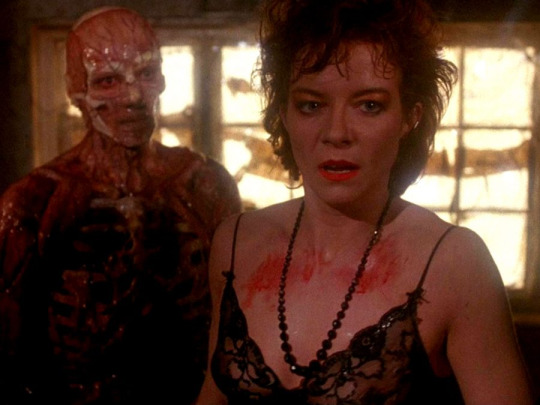
IT'S WEIRD, IT'S KINKY, IT'S GAY, IT'S CHEESY, IT'S GOT PRACTICAL EFFECTS THAT ARE KINDA COOL BUT KINDA STUPID, IT'S GOT THE GRAINY 80S COZY FEEL, IT'S GOT INCREDIBLE FEMALE SEXUALITY AND BAD ACTING, I JUST LOVE IT. It's just a movie I put on when I need to relax and wow it just makes me really happy ;.;
Pet Sematary [1989]
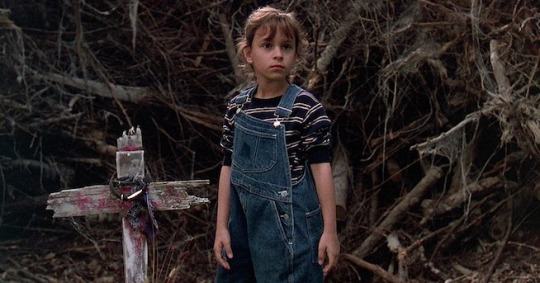
okay this one and the next one and the last one are all GRAINY 80S COZY FEEL, you have to understand that I grew up watching 80s horror from like the age of 5 so that flim look, the grain, the flat lighting, it just !!!!!!! gives me so much cozy fuzzy warmth for childhood and I just adore it. Anyway !!!!!!1 I LOVE THIS MOVIE SO MUCH it's so extremely dark and also extremely absurd, somehow it's so magnetic that you are immediately immersed even though it's got the aesthetic of a bad TV movie, it's just wonderful I adore it. ALSO a rare super faithful Stephen King adaptation!
An American Werewolf in London [1981]

PRACTICAL EFFECTS MY BELOVED!!!!!!!!11 blah blah cozy 80s, but also! FUNNY! ROMANTIC! TRAGIC! SCARY WHEN IT NEEDS TO BE! I'm so deeply deeply impressed by the practical effects in this film, too! But wow it's so good every time, the hot nurse in this movie is a crazy monsterfucker I adore her, it's a good Armand/Daniel AU, the end is a gut punch every fucking time, it's the best, a naked American man stole my balloons, etc. Absolutely perfect film.
Le Fabuleux Destin d'Amélie Poulain [2001]
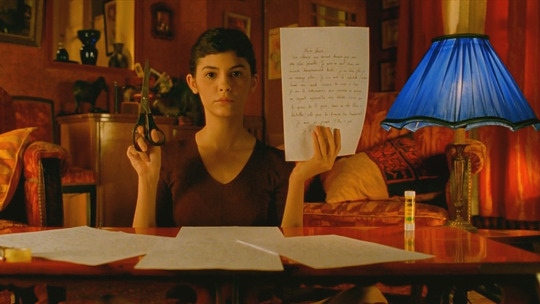
VISUALLY STUNNING FILM ABOUT AN ASEXUAL WOMAN WITH SOCIAL ANXIETY, PLEASEEEEEEEEEEEEEEEEE. I think this movie like, changed my life maybe? I think I saw it when I was 15 or so and it just had such a huge impact on me. I used to watch it so much I would just turn the subtitles off because I'd get distracted and didnt even need them anymore. It's a movie I used to bring with me when I traveled, like I brought the DVD with me when I studied abroad because I was so scared I'd have anxiety or get homesick, I just always wanted to be able to watch it if I need to. IF I WATCH THIS AT THE WRONG TIME OF THE MONTH I CRY MY EYES OUT which is cathartic in the end, idk if it's comfy or comforting but wow. but wow really amazing film it's so beautiful and had such a huge impact on my worldview and my creativity and the way I write and the way I do photography and just !!! ;.; I'm gonna cry!
The Departed [2006]
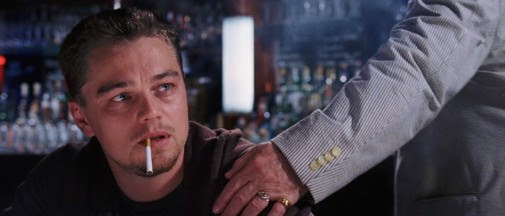
I really like it when Leo DiCaprio cries and he's not a super crybaby in his one but he does scream in pain and have the shit beat out of him and has panic attacks and needs anxiety meds! The cast is sick! The music is amazing! It's such cool storytelling!!! It's exciting every time! The ending fucks! GOD. Just wonderful, I love it so much. The Blu-ray starts over every time it ends so every time I watch it I tend to walk away and let it loop all day LOL. It's disgusting how many times I've watched it. ALSO MY BABE VERA FARMIGA WHAT A MILF god i love her.
Forgetting Sarah Marshall [2008]
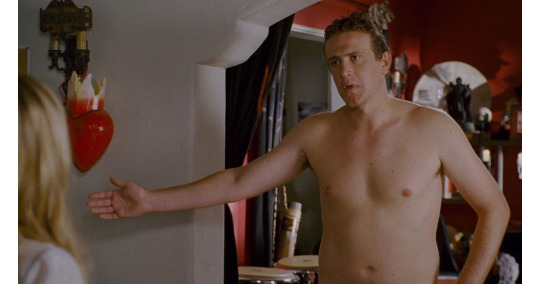
this is like such a perfect comedy for my sense of humor, INCLUDING A BONUS DRACULA SUBPLOT CAN YOU BELIEVE IT, but is actually such a clever and lovely story about getting over heartbreak wow!!!!!!!!!!!!!!!!!!!!!!! I love this movie so fucking much oh my god. Also ever since I worked on ships I feel like especially potent to it because there's something about the social community within the resort that feels so much like the community of a cruise ship crew!! ;.;
Tagging (but no pressure!): @rugbertgoeshome @hekateinhell @mothmage @apoptoses @cup-of-lixx @somevagrantchild @covenofthearticulate
14 notes
·
View notes
Text
Wednesday [IronStrange]
Summary:Tony fights Strange and his weird wizards on a regular basis. So when he is woken up by Jarvis and being told Strange is sitting in his kitchen, waiting to talk to him, Tony just knows that something is not right. What he does not know yet is that it will be a string of very long days.
Relationship: Tony Stark/Stephen Strange
Tags:enemies to lovers, time loop, time shenanigans, hero/villain, hero Tony Stark, villain Stephen Strange, morally gray Stephen Strange, being a villain is a point of view, protecting the timeline, suicide but it has no consequences whatsoever, open ending, hopeful ending, Stephen needs a hug, Stephen and the never ending day, angst, hurt/comfort, fluff, eventual smut, all the stuff you love
Ko-fi | Read it on AO3 | Masterlist | Word count: 3.5k | Previous | Next

Chapter 3: What wizards do
Starting from scratch every day sucked.
But then again, with each new Wednesday that began, they could discard another theory and hypothesis. So in that sense, failure was a success, as it narrowed down their remaining options. Eventually they would find the right path. Hopefully.
_____________________
“What do you even do? I mean your wizard circle. Most of the bad guys we fight are pretty forward with their agenda. But you… there’s no pattern, no ultimate goal we know. You rob seemingly randomly, meddle with political and military business alike, and we traced several ‘accidents’ back to you. But then, sometimes, you save people? Don’t think we don’t know about that.”
Stephen wasn’t sure how much he should reveal. He wasn’t exactly sworn to secrecy, but he also never talked to outsiders about the purpose of the order.
Christine knew a bit of it. Fragments she collected during medical emergencies. Just enough to not ask questions she didn’t want answers to.
When he didn’t say anything, Tony continued. “I take your silence to that question means it’s something I won’t like and that I should ask myself if I really should help you with this.”
He might not be wrong about not liking the answer, Stephen thought. But at that moment he decided to tell him anyway. He wasn’t sure why. Why should he be concerned about what Stark thinks about his motives?
“We are protecting the timeline.”
“The what?”
Stephen put his Starkpad down. “Are you familiar with Brand’s theory of decision branches?”
“You mean that every decision everyone ever faces is like a parting of ways? Depending on the decision made there’s a different version of the future.”
The sorcerer nodded. “We – the order of the Mystic Arts – make sure that the future is steered in a certain direction.”
Tony gaped at him. “If you influence decisions, you’re stripping people of their free will!” This was bigger than he had thought, and he tried to wrap his mind around it.
“No,” Stephen clarified. “We don’t care if you can’t decide between ham or beef on your sandwich. But if it happens that a lost super soldier will be needed in an upcoming battle, we will make sure that we stay in the ninety-five percent of the futures in which he will be found.”
“Bullshit! You didn’t know where Cap was.”
“You’re right, we didn’t. But we knew what needed to happen for him to be rediscovered. On this we just observed; but in other cases we need to intervene.”
He didn’t mention that the Ancient One probably also knew about the kidnapping of Tony Stark and his whereabouts in Afghanistan. And that she let it happen anyway because Iron Man was a key element for what was to come.
That had been long before Stephen ever heard about a place named Kamar-Taj.
Sometimes he wondered where his own car accident fit in all this. But he didn’t think too hard about it. He had made his peace with it and had adapted to his new life.
Tony still wasn’t convinced. “How can you know about the different futures?” He glanced at the golden necklace and hit the mark once again. “Time magic?”
“Yes. It allows me to watch all possibilities of the future.”
Tony clenched his fists, ignoring the screwdriver he was still holding, and narrowed his eyes. “You’re basically telling me, you’re playing god and get to decide which future you like most. Sounds like an awfully lot of power for one single man to me!”
Stephen glared right back at him, raising his voice. “Do you think I asked for this? I just wanted to find a cure for my hands. But then my mentor died and I happened to have a solution to get rid of a world consuming entity, and coincidentally I was able to use the Eye without accidentally destroying the whole time continuum! And after that I filled in for the ones we lost during the fight. This,” he pointed at his chest where the Eye of Agamotto rested, “is bigger than me. It’s not about personal favoritism; about who is the next president or whoever. A threat is coming, whether we like it or not. Whether we’re prepared or not. It’s about no less than half of the life of the whole universe. Every planet out there will be concerned. So, yes, if I have to send a mugger into a side street to make sure the mantle of Batman will be picked up in the future, I will do that.”
Stephen had gotten carried away with his words and revealed more than he had actually intended. He was angry and tired. With a burden on his shoulders he hadn't asked for, but tried his best to hold anyway. At the end of his rant he wasn't sure if his words were solely meant for Stark, or if he did need to convince himself to some degree that he was doing the right thing.
The hurt that had bled through from between the words had taken Tony by surprise, and he realized that the expression that always lingered in those blue eyes was the mark of a man who had seen too much. Of a man who cared deeply, even if he tried to convince himself he didn’t.
Tony recognized it, because he found the same expression whenever he looked into a mirror.
“Half of the universe, hm? Can’t argue against that – if you tell the truth.”
“I do.” Stephen slouched in his chair. He yearned for rest. Not just sleep but being stripped from all responsibilities. But he knew that that day was far away.
“I also can’t believe you brought a Batman reference into this.”
It was an attempt at a joke and to make amends. Stephen acknowledged it with a hint of a smile.
Silence spread and they turned back to their individual tasks. Stephen had already said more than he wanted to and Tony thought about the words he had heard.
“Can’t your necklace tell you a future in which we get out of this loop?” he asked after a while.
“Unfortunately, I can’t seem to access it during the loop, which is highly irritating.”
The more Tony learned about it, the more he got the feeling this was a magic problem after all. Then something occurred to him: something was coming. Could it be…?
“That threat you mentioned… does it come from space?”
“Yes. As I said: the whole universe will be affected.”
“Hm.” The engineer pondered. It could be what he had seen when the Scarlet Witch had meddled with his mind.
But if he were to finally know for sure it was true and to not be able to do anything about it currently… whatever he did, it would be gone tomorrow. And he was already working on one problem that wouldn’t let him sleep. He didn’t need to add more nightmares and panic attacks to it. He would talk to the wizard after this groundhog day was over. It might even be important enough to use the IOU he was being promised. Even if only to know if the vision he’d seen had been true or false. For his own peace of mind.
_____________________
Twelve days in they had collected a lot of data but were still short of a solution.
Tony learned that even if his body was rested in the morning, having his mind working nonstop was not healthy. He was used to pulling all-nighters, but it felt like his tiredness had reached a new level.
Frustrated, Tony buried his face in his hands. He wasn't used to being stuck in a project, and the fact that he couldn't talk to anyone else about it except the wizard didn't make it any better.
Someone put a blanket around his shoulders and when he looked up, he realized it was the cloak that was hugging him sympathetically.
At first the engineer tensed up at that realization, but then he patted the red fabric. “Thanks, buddy.” It wasn’t really helping but he figured it was the thought that counted.
Strange looked at him in sympathy. They had just performed the spell to create the bond between their souls earlier; the warm tingle still echoed in his chest. It was a familiar feeling by now.
“You should take a break tomorrow, Tony. Why don’t you sleep in and meet with some friends?”
“What about-…?”
“It can wait for another day. I’ll do some meditating and meet you before midnight.”
A break sounded really fucking good. Tony already felt guilty because he had canceled his meeting with Peter so often. Even if he knew that it didn’t matter because the boy didn’t remember it.
The look on Stephen’s face when talking to him was gentle and Tony realized that the sorcerer cared. It warmed his heart and made his stomach flip. Uh – oh. The magic man shouldn’t care. And Tony shouldn’t like the thought of Strange looking out for him.
Tony definitely needed that day away from him!
_____________________
It was weird not being woken up by Jarvis' voice stating the words he had probably memorized for life by now.
Between midnight and waking up it felt as if he at least got some sleep and when he looked at the clock it was three hours later than when Strange usually showed up.
“Good morning, Sir,” Jarvis greeted him as soon as Tony moved out of the bed. “I’ll prepare a coffee for you.”
“Thanks. What day is it?” The engineer asked, just to make sure.
“Wednesday the fifth. You have a missed call from Pearson and Specter regarding the launch of the Stark hearing pro aid. You also have a meeting with Miss Potts scheduled at eleven and you told Peter to drop by after school.”
“Move everything that doesn’t need my immediate attention to tomorrow. And invite Rhodey for lunch.” Today he wanted to have his family around him.
“Of course, Sir.”
~~
The meeting with Pepper was very boring. Tony loved it. He was signing papers and they were discussing some new branches of SI and when to launch the next Starkphone update.
It was a constant problem that Tony developed the technology he was offering to the market far too quickly and every now and then he needed to be reminded that people needed to adjust to and accept change. Those things weren’t to rush.
Tony couldn’t relate to that but he trusted Pepper as CEO to make the right decisions.
Rhodey dropped by for lunch in his armor and brought tacos. It was faster than being stuck in New York’s traffic, plus he hadn’t exactly been in town.
They sat on the roof and listened to the sirens and the honking in the streets below.
“Remember that project I told you about?” Tony asked his friend after taking a sip of his soda. “The one with the guy I don’t really like?”
Rhodey looked at him, knitting his brows together. “No. What project? And what guy?”
“We talked about it, Rhodey bear. I called you from the pla-…” Then it hit him. When he had been on the plane on his way to Malibu, he had wanted to say. On another Wednesday.
Of course Rhodey didn’t remember.
“I meant to call you,” Tony steered back. “Probably fell asleep before I had the chance.”
“You? Asleep willingly in the middle of the day?” Rhodey shook his head. “How exhausted have you been? I thought Jarvis kept an eye on you to keep you from pulling all nighters.”
Tony shrugged, an easy smile on his face he didn’t really feel. “He tries his best. You know how I am.” He took another taco and offered Rhodey the last one.
“Tell me about the project,” his friend said. “And since when are you working with partners…wait, we’re not talking about Doom, are we? That guy’s mad and you shouldn’t work with him on anything.”
It was like having a déjà-vu. Tony answered evasively and changed the topic soon after. Rhodey noticed that he was hiding something but he didn’t push it yet.
Fortunately – he would forget it again tomorrow.
Peter arrived in the afternoon long after Rhodey had left. It was great to have the bundle of energy around.
He talked a lot, about school, his friends, and last night’s patrol.
Tony just listened to his rambles while they plugged the Spider-Man suit into Jarvis and ran a check-up – everything was fine besides a small bug which was quickly fixed.
Then Peter told him about May and their trip to the planetarium last weekend. That had been only a few days ago, but to Tony it seemed like weeks had passed. Because for him it had.
He sent Peter home early in the evening, because he knew May would wait with dinner and also because he didn’t know when Strange would come over.
Afterwards, when he was alone in his lab he had nothing left to do for the day. He just took a look at his workspace, where he had spent so much time with the wizard.
A terrible thought occurred to him: what if Strange didn’t come? If he deemed it best to continue searching alone for a solution.
Tony would forget everything.
Some would call it a blessing not to know but Tony had never been one of those. He had always been pro knowing.
Oddly enough, thinking about not remembering Strange tightened his chest.
They were enemies. At least they used to be. But now he’d gotten to know the wizard. And what he had seen intrigued him.
He wasn't sure that he approved of what Strange told him about the timeline and his work and Tony would most definitely not stop fighting him if necessary. But the things that had used to infuriate him, he now found charming. The way the stoic sorcerer expressed his opinion with a single raised eyebrow; his sharp wit and of course his intelligence with a hint of arrogance that was absolutely legitimate.
Strange was hard working, dedicated and had an exceptional mind. It was a dangerous combination.
Tony should know better by now than to get distracted by a handsome face and sharp cheekbones.
There were still two hours left until midnight. Tony had never been good at being patient.
If Strange didn’t come there was no way for Tony to contact him. He didn’t know about his whereabouts, just that he was located somewhere in central New York.
“Sir,” Jarvis spoke up. “Doctor Strange has just appeared in the kitchen.”
There was disapproval in his voice. Tony had instructed the A.I. and told him of their expected visitor. But that didn’t mean Jarvis had to like it.
“Tell him to come to the lab.”
There was a surprised pause from Jarvis. Then, “Are you sure?”. Not many people were allowed into Tony’s private lab.
“Absolutely. I told you: time loop. You can scold me all about it tomorrow.” If Thursday ever arrived.
Shortly after the door opened and Strange stepped in. Ever since their trip to Malibu he had traded his robes for casual clothes, which still seemed out of place to Tony – even though he had suggested them himself. But still, today there was something different about his outfit.
“Where’s Levi?” At some point Tony had gotten on a first name basis with the piece of fabric.
“They stayed home. I just came by for the spell.”
Although he had long since stopped questioning Tony's willingness to stay in the time loop, his voice sounded uncertain today. As if Tony had changed his mind after a day off.It was probably a justified fear.
“Sure, let’s do it.”
By now Tony knew the movements the spell required by heart. The yellowish glowing thread that connected them. The warm tingle that resonated with something deep inside of him.
Relief flooded through him. He knew he would remember.
Strange had a similar expression on his face, but for a different reason. Then he turned to leave. “I’ll see you tomorrow.”
“Do you have somewhere to be in the next…”, Tony glanced at his watch, “hour and a half?”
The sorcerer stopped and shook his head.
“Do you wanna grab a beer and watch a show? I bet we can find something you haven’t binged yet in all of the free time the loop gave you.” It was a lighthearted joke because it wasn’t hard to guess that entertainment hadn’t been on Strange’s priority list.
“I don’t own a TV, so you’re probably right.”
“You don’t… don’t tell me you were serious about not having a phone. I thought you were just reluctant to give your number.” Tony shook his head in disbelief. “Do you write your letters with ink on parchment in the light of oil lamps? Or is that too advanced already?”
Strange made an amused noise. “We do have electricity and I’m happy to inform you that we own a laptop.”
“A laptop? Like in one? For how many people?”
“Wong and I share.”
“Unbelievable,” Tony muttered.
He took the sorcerer upstairs into his living room where they got comfortable on the couch. Almost the entire opposite wall served as a screen. Tony barely used it himself. Mostly for movie nights with family and friends.
They agreed on Doctor House and watched until midnight.
_____________________
“Sir, Doctor Strange has appeared in your kitchen.”
“Clear the day, J.”
_____________________
Somewhere in between, Strange became Stephen and Stark became Tony. They still argued almost every single day.
_____________________
“We could order pizza,” Tony suggested, going through the take out delivery services in central New York.
“We had that yesterday.”
“Sushi?”
“How about soup?” Stephen offered instead. They hadn’t had that yet.
“Who eats soup when they’re not sick?”
“Soup is a perfectly normal meal.”
“Mhm…”
_____________________
“I think we’re friends now.”
“God, don’t say that.”
_____________________
Pepper arrived with the elevator. Jarvis didn’t announce her because, for one, she was family, and secondly, he was very suspicious of what was going on in the lab.
Pepper stopped dead in her tracks as soon as she saw who else was present.
“Can you pass me the tongs?” Tony asked the sorcerer who didn’t even look up from his own work and just made a gesture whereupon the tool floated to the engineer. Tony picked it out of the air. “Thanks.”
“You should consider wearing gloves,” Stephen suggested. “You have a fully equipped lab and still manage to ignore any safety rules.
“Since when do you guys tolerate each other?” Pepper’s voice made them both freeze and they looked at her, as if they had both been caught doing something sensitive.
Tony had forgotten to clear the day. At least he thought so. He should be used to it by now, since he had to repeat it every single day. It was somewhere between day 45 and 52. Tony had lost track of time. One day bled into another and it was always Wednesday. He wasn’t used to repeating any request to Jarvis though. Normally, Jarvis knew more than him.
“‘Tolerate’ is a strong word. We’re working together on a problem,” Tony said while Stephen opted for the smarter option: staying silent.
Pepper put her hands on her hips. “Are you solving that problem or are you two creating it?”
“Haha, funny. We’re-…” Tony suddenly had an idea and he turned to the sorcerer. “What if you’re the problem?”
“Pardon me?” Stephen sounded confused as well as insulted.
“You’re the only one remembering the time loop. It starts with you waking up and ending with you at midnight.” Tony explained. “So whether this is caused by magic or by science: it is linked to you.”
Pepper watched their interaction with a healthy amount of wariness. “Jarvis, what is happening?” she asked the A.I.
“Sir said they are stuck in a time loop and the day is repeating over and over for them.”
“Have you any proof for that?”
“Negative, besides that they seem pretty friendly with each other.”
Pepper's face hardened. She had been there the last time Tony had been working together with magic, and had seen how bad it had ended.
“Tony,” she said louder to get his attention.
He stopped his bickering with the doctor and turned his head to her. “Yes, dear?”
“You know he,” she nodded to the sorcerer, “attacked you at the fundraiser gala just a few days ago?”
Stephen had indeed. But that seemed a lifetime ago.
“I know what it looks like, Pep. But I assure you: it’s alright. Everything is fine, really,” Tony reassured her but his words only raised her distrust.
“How can you be sure he is not messing with your head?”
“I am not,” Stephen protested immediately.
“Pepper, please.” Tony made a step towards her, raising his hands in a soothing gesture.
Pepper retreated a step backwards, not trusting anything that was going on here. “Jarvis, call the Avengers,” she told the Jarvis. “There’s been a breach in security.”
“Pepper no! Jarvis, don’t!”
But it was too late. Jarvis had basically just been waiting for an excuse to intervene.
The Avengers assembled promptly. No need to mention that the day didn’t end well.
#ironstrange#stephen strange#doctor strange#tony stark#stephen strange x tony stark#marvel#mcu#strangeiron#spacemermaid#Wednesday#time loop#spacemermaidwriting
19 notes
·
View notes
Note
“Okay, but I want to do that again. And again, and again, and again. With you; only you.” Sinister/OFC of your choice, please
Ugh...I honestly have no way to tell if this is any good at all. Please, if you read this and like it, let me know. I'm so blind in my writing block these days, I can't even judge when I've done something right.
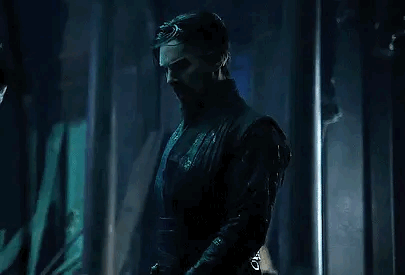
Sinister Strange x Beauty Lincoln (OFC)
This...this shouldn't be happening, she was thinking.
Followed by, it's only a dream...it's just a dream...and I'm not really responsible for what happens in my dreams...am I?
But Beauty knew that wasn't quite right. This was a lucid dream; more than that, it was far from her first. Though it had been months and months since those last ones--and this was far more pleasant than those in the past--his lips on hers were like a taste of heaven after going far too long deprived of Stephen's kisses. She had to wonder, am I so lonely and pitiful and desperate that I'd seek out the dark version of the man I love...the polar opposite of the man who once loved me...just to feel desired again?
It takes two to make this dream we're sharing, precious.
She knew she was hearing his thoughts as likely as he heard her own. That was no surprise, and somehow neither was his assertion. You want this as much as I do, Beauty. I've been waiting a long time for you to let down your guard..."
The claim of his sensuous lips on hers only strengthened as he cupped her face in his powerful hands, further weakening her resolve to deny the forbidden connection between them. Inevitably, she allowed him to nudge her own lips to part enough and accept the slide of his tongue against hers. And of course, the flavor that filled her mouth when he did so was not like her Stephen's at all. Exotic, it was, like some dark rum spiked with unfamiliar spices and promises of a decadence she had never known.
How are you even alive? I saw him vanquish you. Her mind flashed back to the deadly flight of the Eldritch Sword, which her Stephen had used to pierce the black heart of that sinister version of himself. The one who had abducted her while she slept, into the Dream Realm as bait to draw her Stephen--whom he hated beyond any other--to his dying universe. That Dark Strange had died, and thus had troubled her dreams no more--so how was it even possible he haunted her dream now with a clarity that felt real?
Did you really think that was enough to kill me for good, sweetling? Your Stephen was either a fool or misled you. Either way, it matters not. All that matters now is this kiss...and what will follow.
What will follow? Cold panic pierced her mind. Wake up! Wake yourself now, her rational mind demanded, wake up before you cross a line too far...
Yet she was whimpering softly in the depths of his kiss, shivering with the heat this dark and wicked doppelganger had kindled in her flesh. A low growl rose from the center of his chest, and she could feel how pleased this sinister mage was with her inability to hide her sudden, terrible longing.
The advantage was all his as Beauty's will to fight off each new advance slowly melted away in the heat growing between them. This Strange kissed her like he already knew her weaknesses; as if he had studied her and understood her secret desires and was determined to satisfy each one. Surely just part of a game meant to steal her away from his nemesis, for his own ultimate satisfaction.
He twined the elegant, scarred fingers of one hand in her hair and slid his other to the center of her back, pulling her flush against him. The muscles beneath his tunic were as firm as she remembered Stephen's were. Tears prickled her eyes as Beauty reckoned how eternally long it had been since he had held her. And this all felt so goddamn good! She couldn't stop her hands from following the familiar pathways she had loved so well. One lay above his heart, with the other palm against the side of his neck. Despite the paleness of his flesh, it was warm enough to surprise her--while his strong pulse confirmed that this had to be more than a dream.
Mine...mine...mine...
That thought was faint, like the whisp of a whisper, as though this eldritch man hadn't meant for her to hear it.
A surge of anger filled her chest. No. I will not be a pawn in your quest for revenge. Her mind repeated it like a mantra until Beauty was able to pull away, out of his arms and out of the ecstasy of his kiss. She ran her hands through her hair, raising her face to Strange’s, practically hissing the words. 'I will not be your pawn!'
Though the most wicked creature she had ever encountered, his smile--Stephen's smile--had nearly the power to weaken her again. But it was his words that broke through the haze of her ire. 'Oh, sweetling. This has nothing to do with revenge.' Strange took a tentative step forward while Beauty held her ground. 'But I recognize your lonely heart because mine is more lonely than most people could ever fathom. Is it impossible for you to accept that I've been trying to reach you because I'm wanting you for you? For the lovely light of your soul that has called to me like a beacon. Like a promise of just a bit of redemption after the crimes that have stained not just my fingertips but my very soul black.'
Beauty lowered her gaze, fixing her sight on this Stephen's tremoring hands. In truth, she neither felt nor heard any trace of deceit in his confession. She was remembering her Stephen in their beginning days. How skittish he had been and how patient she had had to be. Offering him friendship in lieu of the far deeper love she had longed to lavish upon him. Would it be wicked of her to show this Stephen at least a little kindness? Especially as he was so alone in his reality, and she so lonely in hers?
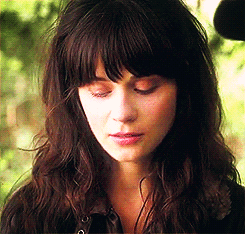
'We'd have to set some ground rules,' she told him softly, reasonably. 'You can't just barge into my dreams when you feel like it, and you certainly have to honor whatever boundaries I set...' He was nodding his compliance, wearing that irresistible Stephen smirk, and his eyes, a deeper, richer blue than in her reality, seemed focused on her mouth. And somehow, she felt her lips tingle pleasantly with the rich memory of when their lips first met.
Okay, but I want to do that again. And again, and again, and again. With you; only you.That thought came through clear as day!
Beauty gave a little shrug, quietly pleased by his insistance, but determined that he'd have to prove himself before she granted him a single kiss more. 'Now, I have an early meeting tomorrow, so I really do need a full night's rest. And the next time you visit my dreams, we'll be spending the time together platonically. Does that work for you...Stephen?"
Sufficently chastened, Strange gave a courtly sort of bow, and then with a flourish, conjured a single, long-stem pink rose and handed it to Beauty. With that, he dissolved into a purple mist, his last words like an echo that followed her into a deep, contented sleep. Sweet dreams, Beauty, dear. As sweet as the kisses I will win from you someday soon.

kissing prompts
tagging: @strangelock221 @strangelockd
#my writing#kissing prompts#strangelock221b#Sinister Strange#Beauty Lincoln#Sinister x Beauty#Sinister Strange x OFC#Sinister Strange x Beauty#doctor strange x ofc#stephen strange x ofc#doctor strange fan fiction#doctor strange fanfiction#stephen strange fan fiction#stephen strange fanfiction#Strangebatch#My Eternal Muse#benedict cumberbatch
52 notes
·
View notes
Text
AU off of OhMyStarryNight’s human ttte AU :) (I got permission)
In this AU, the previously mentioned au is the same, except in this one when one gets charge of an engine, they sometimes receive what I consider ‘enlightenment’ through visions or sometimes physical powers like elemental or something like that. The purpose of this is unknown but always beneficial to the receiver. The engines, visibly not alive, is unknown if they are sentient or just vessels for such enlightenment or something else in entirety. It is rare to receive such enlightenment and even more rare to achieve a physical element to manipulate. Only one (later two) is known to have regular enlightenment and physical manifestations of power, which is Stephen.
The beginnings of this branch AU for me, which involves Thomas, James, and Edward. Thomas, as the rascal he is, decides to endeavor in another random shenanigan which results in his engine being in need of repair for the breaks. However, Thomas, despite various warnings decides to ‘home repair’ his engine breaks. It fails. Miserably.
On a return trip down to somewhere, Thomas’ breaks fail. With a full load of trucks. Thomas, panicking, alerts the attention of Edward, who chases Thomas down with his engine and ends up ✨fancily✨maneuvering down the line of trucks into Thomas’ cab. However, it was too late to try and stop as they are nearing the bend that led to an overhead bridge pass.
Edward, in an act of love, shoves Thomas out and down into the shrubbery alongside the forestry next to the track. Edward crashes. And it was a nasty one. The overhead bridge breaks with James crossing it and ended up pinning Edward underneath James’ engine and the wreckage of the stone overpass bridge. Thomas, screaming, went to go and get Edward out of the wreckage but ends up being held back by James. Edward gets rescued by the rescue team but is quickly evident that he is paralyzed from the waist down and is put on hospice notice.
Thomas, inconsolable, takes care of Edward and barres everyone out; except James. Edward ends up passing away while James dragged Thomas to be outside for the first time in months and that, added with Edward’s death, sent Thomas over the edge mentally. Thomas withdraws and ends up refusing the rebuilt #1 engine and gets hired as a diesel worker.
Afterwards, Thomas finds himself having visions through his new engine and gains the ability of super strength, similar to Diesel 10 who possesses the same ability and mentors Thomas. Taking this as a sign, Thomas renames himself as Spark and becomes (and behaves) like a diesel worker, taking the break handle from his former engine as a souvenir and a weapon.
The rest of the team, estranged and grieved with the symbolic and literal loss of two of their teammates kinda wait for a miracle. A miracle they got….after Sodor was almost taken over. The railway was run over by runaway bandits and was saved by the diesels and steamies working together, but the real winner was on Christmas Eve. This was Spark’s lowest point and in his grief created a new ability; soul splitting. Spark, in his grief memory, created a childhood version of himself and ultimately rejuvenated Edward as well. Using these projections, Spark and the steamie team both got what they wanted. Spark got his peace and the team got their friends back.
Spark occasionally gets teased and is called ‘the original’ but he also wears a partial mask to hide his scars after fighting off a wave of bandits in the steam works and getting burned badly by the equipment.
feel free to ask me questions! :)
2 notes
·
View notes
Text

Paul Morrissey
Film director whose close collaboration with Andy Warhol included the trilogy Flesh, Trash and Heat
Andy Warhol’s films, which tested the endurance of audiences and made icons out of the marginalised and dissolute, altered profoundly the nature of cinema. Much of the work which bore his name from the late 1960s onwards, however, was made by the writer-director Paul Morrissey, who has died aged 86. “Warhol is a trade term,” said Morrissey. “Like Disney.”
About his famous friend and collaborator he could be comically scathing. “He didn’t have many points of view,” he said in 1996. “He didn’t have many ideas at all, actually. Maybe three. If he made a choice, it was almost always the worst possible choice in the world.”
Stephen Koch, the author of Stargazer: The Life, World and Films of Andy Warhol (1991), called the two men “mutually incompatible talents … Morrissey utterly blind to the refined complexity of Warhol’s experience of the world; Warhol wholly incompetent to assemble the often beguiling commercial product Morrissey sells under Warhol’s name.”
The first decade or so of Morrissey’s career was given over to orchestrating and managing projects under the Warhol name: not just the films but the stewardship of the avant garde rock pioneers the Velvet Underground (whom he had brought to Warhol’s attention) as well as the launch in 1969 of the influential magazine Interview, which Morrissey co-founded. It sometimes seemed as though the rest of his life was spent fighting to have his contribution recognised.
Morrissey was also Warhol’s personal manager from 1965 to 1974. Asked what this entailed, he said: “I had to think of things that he might do, I had to do them, and then I had to pretend that he was involved.” The two men met in the early 60s when they were both showing their work in New York. After Morrissey had assisted on, and co-directed, Warhol’s films for several years, a turning point arrived in 1968 in the shape of the camp western Lonesome Cowboys.
“Before that, I had been helping Andy make the kind of movies he wanted to make, which was the kind of movie which looked like nobody had made it,” Morrissey said in 1978. “Lonesome Cowboys was the first time we were making an effort.” The characters, including gay gunslingers, were still bickering and flirting and talking about their hairdos, as they had always done, only now they were doing it outdoors in Arizona, wearing costumes and riding horses, rather than lounging around in ratty Lower East Side apartments. This combination of tones and styles (timeless genre conventions side by side with a modern, spaced-out looseness) introduced a new piquancy.
Morrissey achieved his most striking results with the acute, funny and freewheeling trilogy of Flesh (1968), Trash (1970) and Heat (1972). Each showcased the sullen, swaggering beauty of Morrissey’s discovery Joe Dallesandro (immortalised as “Little Joe” in Lou Reed’s song Walk on the Wild Side), alongside “Warhol superstars” such as Viva and Jackie Curtis, and the transgender actors Candy Darling and Holly Woodlawn.
The pictures presented a compassionate portrait of outsiders struggling to make and maintain emotional connections. The great director George Cukor declared himself “lost in admiration” and even instigated a campaign, ultimately unsuccessful, to land an Oscar nomination for Woodlawn for her performance in Trash.
The plots of these movies were threadbare – Flesh, shot over the course of five Saturday afternoons, follows a hustler trying to drum up the money for a friend’s abortion – and sometimes second-hand. Heat, for instance, partially recycles Sunset Boulevard. But it was the attitude that counted, as well as the ambiguity over whether the films constituted art or reality. Though the performances could be affectless to the point of mundanity, Morrissey was adamant about the dividing line between cinema and life. “If a person is in front of a camera, they’re acting,” he said. “It’s not possible to live in front of a camera. What I always believed in was the truthfulness of artificiality.”
Born into an Irish Catholic family in New York, Paul was the son of Joseph, a lawyer, and his wife, Eleanor, and he remained a devout Catholic all his life. He was educated at Fordham preparatory school and Fordham University, where he began making 16mm films.
His first short depicted a priest saying mass on the edge of a cliff before throwing the altar boy to his death. Another, Civilization and Its Discontents, featured “a hood in a pea jacket strangling a fat albino” while Like Sleep showed two drug addicts nodding off. These brought him to Warhol’s attention and led to his involvement on films including My Hustler (1965) and Bike Boy (1967). His first feature-directing credit, shared with Warhol, was on the three-and-a-half hour, split-screen Chelsea Girls (1966). It was precisely the formalist experimentation of that film which some Warhol loyalists accused Morrissey of betraying when he manoeuvred the artist’s brand toward the ordered narratives of Hollywood melodrama.
While Warhol was recovering after being shot by Valerie Solanas, founder and sole member of the Society for Cutting Up Men (SCUM), Morrissey assumed full creative control over the films – or, rather, his creative control over them was finally made explicit. After Flesh, Trash, Heat, and Women in Revolt (1971), which included a send-up of SCUM in the shape of PIGs (Politically Involved Girls), Morrissey moved in a different direction. Taking Dallesandro with him, he made a pair of kitsch, gory but technically accomplished horror films in Italy: Flesh for Frankenstein (1973) – released in the US as Andy Warhol’s Frankenstein – and Blood for Dracula (1974). “I’m always a little afraid of getting stuck doing one thing,” he admitted.
No one could accuse him of that. Flesh for Frankenstein was shown initially in 3D, so that a man whose hand is sliced off seemed to bleed all over the stalls, his guts wobbling in the audience’s faces on the end of a sharpened pole.
Morrissey’s next film, The Hound of the Baskervilles (1978), was even more unlikely: a madcap take on Sherlock Holmes starring much of the British comedy establishment, including Peter Cook, Dudley Moore and Kenneth Williams, as well as the theatrical giant Joan Greenwood, who remarked of Morrissey: “He’s a dear, really, but the first few days one didn’t know where one was. One got used to him. He’s jolly clever.” Critics were less impressed: Time Out magazine remarked that “a first-year film student would be ashamed”.
He continued making films, including Forty Deuce (1982), starring Kevin Bacon as a hustler, and Mixed Blood (1984, aka Cocaine), about Hispanic drug dealers in Manhattan, and spent most of the rest of his life talking about, and clarifying his part in, the Warhol story.
He remained throughout his career proudly rightwing, outspokenly moralistic and wholly indignant, railing against everything from drugs – “There’s no difference between a person using drugs and a piece of refuse” – to method acting: “When you see people like Daniel Day-Lewis and Ralph Fiennes screaming and hyperventilating, you’re seeing the phoniest kind of bad acting. You may as well have a ‘men at work’ sign. It’s not acting if you can see it.”
Despite the marginal nature of much of his work, he was at heart a populist. “I’m very traditional about everything,” he said. “I like action, comedy, pretty colours, pretty people. Art is a formula any idiot can manage. Competing in the marketplace is the only challenge left.”
He is survived by his brother, Kenneth.
🔔 Paul Morrissey, writer and film director, born 23 February 1938; died 28 October 2024
Daily inspiration. Discover more photos at Just for Books…?
3 notes
·
View notes